#kat's analysis🔍
Text
"Certainly Humans are Sinfully Stupid, but What's wrong with that?"
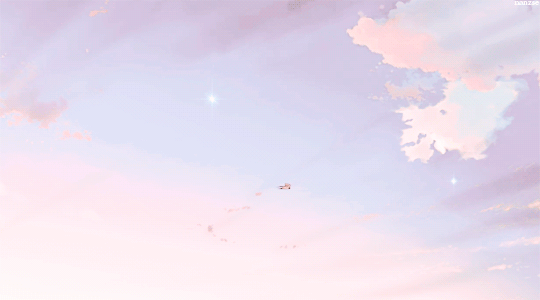

Summary: I will be dividing this essay into two main parts to address what Dazai had said in this panel to Dazai-sensei's writing. Then, in one short part I will attempt to connect some of what I had said back to BSD Dazai as a theory.
A/N: Basically take it as me rambling about my favorite bsd dazai panel and some of my personal take on dazai works which escalated and turned out much longer than I originally imagined... (by that I mean this became 6k+ words) Also just my contribution to Dazai's birthday <3 Also note that use of Chinese is present in this, since it’s much easier to find translated works of Dazai in this language, but if I do quote it, I will attempt to translate it
Warnings: Mentions of suicide, (if you're uncomfortable with it) religious wording, spoilers to some of Dazai's stories (works discussed [in relatively more detail]: No Longer Human, Otogizoshi, Blue Bamboo, Thinking of Zenzo, 正義與微笑, 思考的蘆葦)

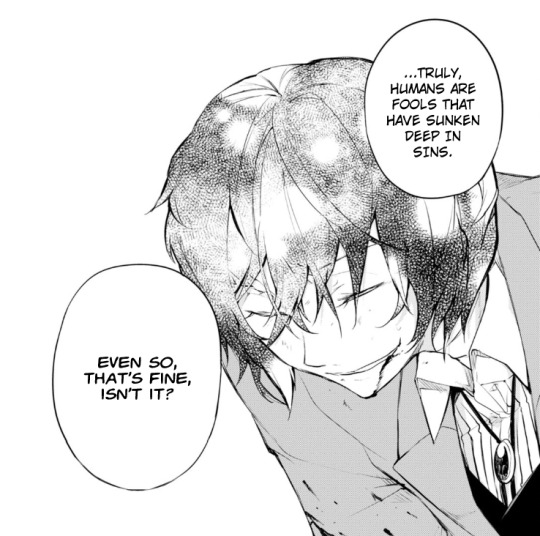
1. Dazai about Human Weakness
2. Realization of “Sin”
3. “But what’s wrong with that”?
4. Brief Thoughts on BSD Dazai vs Dazai-sensei
5. Final Notes
6. Citations
This is probably my favourite Dazai panel out of all the manga panels of him there is. From his expression to his words, there's just so much to say about this panel. Yes, it always comes back to this panel with me, and I just incorporated it in my last analysis as well. But what I have more to speak on is how I personally see it connected to my view on Dazai-sensei's works that I have as of now.
So, I will be dividing this essay into two main parts to address what Dazai had said in this panel to Dazai-sensei's writing. In the first part, I shall address how it connects to my understanding of Dazai's works. Firstly by looking at the "sinful and foolish" part of Dazai's dialogue to Dazai-sensei's views on human weakness. Then, I will further elaborate on the choice of word "sin" which is present in both translations of this panel that I have seen. Finally, I shall address the latter part of Dazai's statement, a seeming acceptance of human weaknesses to Dazai-sensei's acceptance of humans in their paradoxical natures, especially in his middle-period works. Then, in one final part, I will attempt to connect some of what I had said back to BSD Dazai (though I would say this is more of a theory than an analysis).
In addition to Dazai's works, I will also be referring to some academic research in this for the sake of some sort of objectivity and aid, since I am not Japanese, no scholar of Dazai nor Japanese literature, my knowledge can only reach so far (even more so when I am reading translated versions and the fact that I do not know Japanese literary traditions), I am merely someone interested in Dazai’s works… I must also acknowledge that there are some biases on my side since this contains some of my personal interpretation of Dazai's works alongside my limitations since, I have also read a limited amount of Dazai’s works, so take it with a grain of salt, but I wanted to write down my thoughts. As for my Chinese literature/philosophy analysis I have embedded in a minor part, (source?) you can trust me (but as a Chinese person and having studied it as a local I can say with some sort of confidence that I know what I'm talking about).
1. Dazai about Human Weaknesses
“The weak fear happiness itself. They can harm themselves on cotton wool. Sometimes they are wounded even by happiness.” - No Longer Human[1]
Just as Dazai in this panel addresses the sinfulness and foolishness of humans. Human weakness and the human struggle in life are recurring themes quite often observed in Dazai's writing. In fact, when reading about Dazai in Chinese, I have sometimes come across his work being described as "the weak's literature" and even "the friend of the weak"[2]. In fact, at the end of Dazai’s short story Canis Familiaris he wrote about this directly, saying "the artist is the friend to the weak, that is his first motivation and ultimate goal".
In fact, readers of No Longer Human alone can sense this. Such as from Yozo's acute awareness of how humans behave, with their deceptiveness making it so he is unable to take their words at face value, to within Yozo himself, in that he sees himself as too cowardly, and weak to even reject other people, and even in the acute sensitivity readers see in Yozo which he fails to acknowledge that can be seen in how he equates his father's neutral expressions and lack of words as strong disapproval. I personally see Dazai to also be a quite sensitive person, if you read some of his open letters or just think about how he can acknowledge the things Yozo views in humans in the book.
In other works Dazai has written, human weakness is a concurrent theme. Such as in Run Melos! (a rewrite from an ancient Greek myth) Dazai mainly changed the main character's thoughts, such as considering betrayal and the guilt that follows, and how both Melos and Selinuntius both succumbed to it to some degree. Or how in his novel 《正義與微笑》 (From Chinese would be translated as Justice and Smile, I hadn’t found a translation of it in English;;), with the novel speaking about a teenager and his aspirations, observations and insights as he is growing up, how he is often met with disillusionment from everywhere from high school to university, in people and even in the path to his dream job. And multiple times throughout the book he succumbs to weakness as he thinks about giving up again and again on his current goals and dreams.
Perhaps, something quite fascinating which I have read in the essay Dazai's Women: Dazai Osamu and his Female Narrators, it is because Dazai is known for holding human weaknesses at high esteem, though, at first to the reader, they are seemingly portraying weakness in a bad light, in reality, he often uses such human weaknesses to humanize his characters[3]. This is most obviously portrayed, again, in No Longer Human, in which Yozo throughout the whole book sees and portrays himself as inhuman and utterly disqualified to be a human being. The title, however, is ironic as when readers look deeper into Yozo’s narration, they will be able to see that he is very often tripped up by his own very human weaknesses, even some of which are seen as terrible by societal standards, they are what make him nothing but human, some may perhaps even begin to describe Yozo as the most human person in the novel, or perhaps even too human.
Therefore, in fact, even though on the surface it may seem that such is portrayed in a bad light, the same essay says "according to Ueda: “in [Dazai’s] view, an evil person is a man who has no understanding of, and therefore no sympathy for, human weakness" [3]. From what little amount I could access to Ueda’s book, he also said that “Dazai discovered that ‘human reality was ultimately filthy and ugly’ and maintained that ‘literature should not concern itself wholly with the fact’ but with a deeper truth, namely the beauty of man’s basic human weakness”[4].
This may perhaps have something to do with the fact that "Dazai" saw himself as a weak person[5], in fact, he kind of admitted to it in his book Otogizoshi, where he wrote that “while I presume to understand to some extent the psychology of the weak, perhaps because I’m a helpless sort myself, I’m afraid I don’t really have a clear understanding of the psychology of the powerful—particularly the absolutely invincible variety, which I’ve never met or even known to exist”[6]. Though this is debatable since according to the book Dazai Osamu, it writes Dazai likes potraying himself as a failure. If you think about it the fact that he is willing to cut so deep to look into human existence shows a slightly different perspective, there seems to be some sort of bravery and strength necessary to it. So simultaneously when reading how Dazai often describes himself or the narrator as weak, this is something we must keep in mind, also to keep in mind some sort of objectivity despite the use of personal modes in Dazai’s works.
And perhaps this influenced why Dazai saw human weakness as not only an essential human trait but also something to be proud of, and something in which one could find beauty[7].
2. Realization of "Sin"
“The Bible says, "he who is forgiven little, loves little." Do you know what this means? Only those who are confident that they have made no mistakes in life are heartless. Those who are sinful have deep affection.” - Dried Leaves of Spring[8]
So how does Dazai find beauty in human nature and its weaknesses?
Before I address this, I must first acknowledge why the choice of the word “sins” or “sinfully” (depending on the translation) in this panel is important. Not only is it because it is (sort of) mentioned in No Longer Human in the synonyms and antonyms game Yozo played:
I said, feigning tranquillity, "Crime. What's the antonym of crime? This is a hard one."
"The law, of course," Horiki answered flatly. I looked at his face again. Caught in the flashing red light of a neon sign on a nearby building, Horiki's face had the somber dignity of the relentless prosecutor. I felt shaken to the core.
"Crime belongs in a different category."[9] - No Longer Human
Though in Donald Keene’s translation (which is the translation that is most commonly seen), it is translated as “crime” perhaps since Yozo references Dostoyevsky’s Crime and Punishment. Interestingly enough in Chinese and Japanese, Crime and Punishment are written as 罪與罰 and 罪と罰 respectively, and from my knowledge in Chinese, with 罪 meaning both crime and sin. For further proof of this, in the article A Religion of Humanity: A Study of Osamu Dazai’s No Longer Human, Hijiya also changed the translation of “crime” to “sin”, and in their notes, they acknowledged that they “[had] taken the liberty of changing certain terms and phrases in order to bring out the fuller meaning of the original”[10].
Along with that, it should also be understood that Dazai had read the Bible, he even referenced it across some of his works which I have read such as in sections of 《思考的蘆葦》, 《正義與微笑》 which has moments with the main character speaking of the Bible with his brother and even in Fallen Flowers, in which he parallels himself to Thomas’ doubt on Christ’s resurrection as well as the quote I have selected above. However, Dazai was not a Christian, but he read it thoroughly and tried to interpret the Bible according to his own terms, and it is suspected that Dazai “sensed some kind of dark side in humans that can be identified with the Christian notion of sin”, the essay I read suggests if not the Christian notion of sin, it is perhaps similar to a sense of human frailty that is deep within every person[11][12]. So though when referring to "sin" on Dazai's side isn't really religiously connected necessarily, but it's difficult to think of a word to replace it, so I will add quotations, also this wording will benefit the understanding of a latter part.
With this understanding, we can now return to Dazai and human weaknesses to address the quote at the beginning of this section in which Dazai sees people who are “sinful have deep affection”[13]. This, however, does not directly mean that those who have committed many crimes have deep affection, rather it is “those who sin and have a deep realization of their sinfulness become modest, kind, and deeply affectionate people”[14]. This is fitting for "Dazai" whose unwavering conviction in writing literature was “remorse, confession and reflection”[15]:
「您到底——」客人似乎也對我的優柔寡斷生氣了,換個語氣說,「對於寫小說抱持甚麼樣的信念?比方說,人道主義,或是愛啦,社會正義啦,美啦,那些東西,打從您步入文壇,直到現在,乃至將來,可有這樣一個始終堅定不移的信念?」
「有的。是悔恨。」這次,我終於可以不假思索立刻回答。「沒有悔恨的文學,只不過是狗屁。悔恨、告白、反省,近代文學——不,近代精神想必就是從那之中誕生的。因此——」我又結巴了。- 海鷗 from 《思考的蘆葦》(A short story I enjoyed but hadn't seen in English as well)[16]
Translation by me (with possible errors):
"You—" the guest also seemed to be angry at my fickleness, and said in a different tone, "what convictions do you hold about writing fiction? Humanism, for example, or love, social justice, beauty, that stuff. Since the time you entered the literary world, until now, and even in the future, can you have such an unwavering conviction?"
"Yes. It's remorse." This time, I could finally answer immediately without hesitating. "Literature without remorse is just bullshit. Remorse, confession, reflection, modern literature—no, the modern spirit must have been born out of that. So—" I stuttered again.
I think it's also really interesting that in The Setting Sun, Dazai also wrote “'I wonder if there is anyone that is not depraved’ Naoji wrote in his notebook... Perhaps by depravity he actually meant tenderness”, which also fits this idea.
And, therefore, it is perhaps this deep realization of “sin” that Dazai harboured that allowed an establishment of a sort of kindness in his work[17]. So, below, through No Longer Human, and Thinking of Zenzo, I will attempt to establish how in Dazai’s work we can showcase the connection between the realization of “sin” and affection.
Beginning with No Longer Human, Dazai conveys this through Yozo’s fragilely sensitive nature, though on one hand causes him to see the dark side of human nature, and on the other allows for him to be sympathetic towards those in sorrow and pain:
“People talk of “social outcasts.” The words apparently denote the miserable losers of the world, the vicious ones, but I feel as though I have been a “social outcast” from the moment I was born. If ever I meet someone society has designated as an outcast, I invariably feel affection for him, an emotion which carries me away in melting tenderness.” - No Longer Human[18]
Additionally, from an interpretation I quite like from The Religion of Humanity, Yozo’s invention of clowning can also be interpreted as an establishment between the realization of “sin” and affection. Because as Hijiyam mentioned, just as clowning serves as a means for Yozo to protect himself, it is also “a positive means for him to demonstrate his compassion and understanding”[19], to identify with people despite his dread of them as his “last quest at love [he] was to direct at human beings”[20]. Though by doing so, he only further recognizes his “sinfulness” in his deceit, which alienates him, it is what ultimately allowed him to identify with the outcasts in the first place. I think it's also fascinating that in his novel 《正義與微笑》the main character's main belief he constructed from the beginning of the novel was 「以微笑行正義」 (tr. to practice justice through a smile), and so by becoming an actor at the end of the novel, which is an extension of this belief, it conveys a sense of "love", as described in the translator's note, along with justice[21].
Whereas in the short story Thinking of Zenzo (one of my favourite Dazai short stories), this sense is not as obvious as that in No Longer Human. I have always found it fascinating that at the beginning of Thinking of Zenzo "Dazai" decided to acknowledge and confess his "sins" before the beginning of the narrative (though admittedly I tend to forget about this part):
“Forgive me. That was uncalled for. I'm in no position to stand above humanity, acting as prosecutor, or judge. I have no right to condemn others. I am a child of evil. Beyond redemption. I suspect my past sins are fifty or a hundred times greater than yours. And even now I continue to sin. However I try to watch myself, it's hopeless. Not a day goes by that I don't do something evil. I could prostrate myself before God, my hands bound together with ropes, and devote myself to prayer, but even then, before I knew it, I'd be committing some atrocious deed. I'm a man who ought to be whipped. Whip me till the blood spurts out; I would have no choice but to bear it in silence.” - Thinking of Zenzo[22]
And perhaps because of this realization of “sin”, although "Dazai" (it should be noted that his wife actually said that only about 50% of this story is truth of what she witnessed) narrated the story with him being sold roses by a fraud, him being too weak to refuse, and him commenting on how the people from his hometown dislike him. But he continues to wish that the woman who had swindled him could prove to him that she wasn’t lying.
So, when later finds out that even though the woman, in the beginning, had swindled him into buying the roses, that was just as good as she said, and that she was probably “[one of those] people who make their living selling things [by lying] even when they don't need to”, he not only felt contented.
“Taking a seat on the veranda, puffing at my cigarette, I felt not a little contented. God exists. Surely He exists. Green pastures are where you find them. Behold the fruits of non-resistance. I considered myself a fortunate man. They say to experience sorrow at any price. That the blue sky is most beautiful when seen through a prison cell window. And so on. I gave thanks. And for a moment, this thought flashed through my mind: As long as these roses are living, I am king of my own heart.” - Thinking of Zenzo[23]
He even equates the woman with the people from his hometown by saying:
"Maybe she was from my homeland, that woman," I said. My cheeks felt warm for some reason. "So she wasn't entirely a fraud, eh?" - Thinking of Zenzo[24]
Seeming not only to have accepted the actions of the woman but also the people from his hometown.
And so when looking at the text as a whole, understanding that it was first framed by his recognition of his own “sins”, then by his narration on the roses, before finally his gathering back in his hometown, and ending with a seeming acceptance of both those that have seemingly “wronged” him, one can wonder if the recognition of “sins” is once again, as we viewed in No Longer Human, the key to such affection he found at the end of the story.
3. "What's wrong with that?"
“請你更積極地愛這個俗世,恨這個俗世,一生都沈浸享受其中吧。” - Blue Bamboo (tr. Please actively love this world, hate this world, immerse in it all your life)
Following the line of thinking above that the realization of “sin” and weaknesses therefore could allow for affection and kindness. Below, I will argue that this understanding, perhaps allows a sort of acceptance for humans and even their paradoxical natures, which is present in some of his middle-period works, such as Blue Bamboo, and the stories from Otogizoshi.
In Blue Bamboo, this sense of finding peace within the human world, regardless of its flaws is perhaps the most obvious out of all the works I will discuss, at least to me. Especially with its ending as "he ever again heard to utter another pompous word about the ‘Way of the superior man’ but quietly carried on in the same humble poverty as before” even though he previously said, “The world is drunk; I alone perceive the truth!” and in the end even decided to “bury himself in the dust of the world”[25].
Before I explain more thoroughly how this portrays what I intend to argue, I should note that Dazai said that he “wrote [Blue Bamboo] in the hope that it would be read by the people of China. It is to be translated into Chinese”, it is also a rewrite from a Chinese tale[26]. Therefore, within the story itself, there are references to Chinese philosophy, culture, and allusions to Chinese literature that people who are not familiar with Chinese literature may miss. Therefore, below I will explain some of the terms and allusions which may be missed.
Firstly, the “way of the superior man” or what we call Junzi (which literally means gentleman), is a reference to Confucius and his Analects, and it is a Chinese philosophy of life, and the term Junzi it contains the idea about how their moral conduct makes them a moral exemplar, basically if you're a Junzi you are a moral exemplar. This was an important concept in ancient China, I would say, and can even be seen to be followed by a good amount of ancient Chinese poets, and is why, if you are familiar with Chinese poets, poets sometimes go into recluse-- to separate from the “vulgar” worldly concerns and the corruption of the court, to showcase themselves as different and lofty than others. Though perhaps you will think it is arrogant of them, this was in fact seen as noble. I should also note that these Junzi needed to follow certain rules, one of which is to not associate themselves with those who are of “inferior” morals, hence why they go into reclusion I guess, again you can find them in Confucius and his Analects.
Secondly, I must address the allusion to Qu Yuan (if you know about the Dragon Boat Festival, yes this festival is to commemorate him) through the fact that Yu Jung quoted his most famous last words: “The world is drunk; I alone perceive the truth!”. Which in Chinese is「眾人皆醉我獨醒」, if we translate it directly it means the world is drunk only I am sober, which on a more metaphorical level talks about the corruption of the Chinese royal court, and how he is the only one to not be tainted by the corrupt ways of the court, and that he alone perceives the truth that they are corrupt. The phrase that Dazai quoted is symbolic of this sentiment because literally, it is using the world being drunk, in contrast to him being sober, as a juxtaposition to convey how he is superior to the rest of the world. I also like to add that this is not the whole statement, the first half of the statement was「舉世皆濁我獨清」, basically saying that he is the only pure one in the world of the corrupt, or in direct translation would mean filthy.
So, understanding these concepts, when going back to the story Blue Bamboo, we would understand that what I had mentioned implies that even though Yu Jung saw the corruptness and “filthiness” of the world, but still decided to give up the “way of the superior man” in the end which would keep him “pure”, and decided to live and dwell in this corrupt world and “bury himself in the dust of the world”, which I guess could be a connection to the first part of Yu Quan’s statement.
Perhaps this is the result of the fact that though he seems to want to follow the "way of the superior man", he still finds himself attached to the world, as indicated in his dialogue: “It’s so beautiful. How I’d love to show this to my wife back home!” even though he was taken to a haven out of the reach of man[27]. Though this seems to be paradoxical for Yu Jung, Dazai’s work didn’t punish him, and in fact, it was encouraged by Blue Bamboo, the one who brought Yu Jung to the haven.
“It appears you can’t forget your wife after all,” whispered Blue Bamboo, peering at him.
“Don’t be silly. That woman hasn’t the slightest respect for my learning. She makes me wash the dirty clothes, and push boulders around... Besides, they say she’s my uncle’s mistress. There’s nothing about her that’s worth remembering.”
“Perhaps that’s precisely what you find so precious about her, precisely what makes you miss her so—that she’s beyond redemption. I’m certain that’s what you really feel, deep inside. Didn’t Mencius say that compassion lies deep in every man’s heart? I think your true and greatest aspiration was to share life’s hardships with your wife, to live with her free of malice or resentment or spite, for the rest of your days. Go home.” Blue Bamboo’s countenance had suddenly taken on a forbidding sternness; she spoke the words sharply and without the least equivocation. “Go now.” - Blue Bamboo[28]
And another interesting thing is that in the original version of the tale, Yu Jung’s wife was not portrayed as bad as in Dazai’s version, yet the fact that Yu Jung still thinks of her, could perhaps, allow Dazai to further showcase Yu Jung’s inability to let go of the human world despite its woes[29]. All of this, which is full of contradictions, yet wholly accepted by both characters of the short story thus allows the main message of the story to be conveyed:
“Human beings must suffer through their entire lives amid the love and hate that rule their world. There is no escape. All you can do is endure. Endure and struggle, struggle and endure. Learning is a splendid thing, but to make a show of having risen above worldly affairs is cowardly and mean. You must become even more attached to the world, and spend your life immersed in the hardships it presents you with. That’s what the gods most love to see in a person. I’m having the servants prepare a boat for you. Get on it, and return directly to your home. Farewell.” - Blue Bamboo[30]
An acceptance of humans with all their flaws and contradictions. Also, if you read more of Dazai’s work, you would perhaps realize that the phrase being “unable to renounce [human] society”[31] or a similar sentiment appears more often than you would think, as off the top of my head in addition to Blue Bamboo, I can think of 3 other works: No Longer Human, Thinking of Zenzo and Otogizoshi that have such a sentiment present in them.
Similarly, Dazai’s four stories in Otogizoshi also present a similar picture, in which the main character escapes or attempts to escape to a haven beyond the human world due to their discontent with the real world, these havens only last for these characters a little while before they are returned to the real world. I think the book Studies in the Comic Spirit in Modern Japanese Fiction describes it really well:
“In the "forgetfulness" that consoles Urashima when he finds himself a lonely old man, in the husband's bitter smile and his comment "I owe my good fortune to my wife; I made things so hard for her" at the conclusion of Shitakiri Suzume, even in the plaintive "Was it wrong to love you?" that summarizes the Tanuki's demise in Kachikachiyama, there is a similar note of acceptance, an understanding that we can only reconcile ourselves to the ultimate irreconcilability of things. Contradictory characters, even the contradictions within a single character, must be taken as they are; and it is better to accept them with a smile, however faint, than to bewail them.”[32]
I also think it is interesting to note that in the same essay it also talks about how “these idealized or liberated worlds exist only so that the characters may return from them to their ordinary worlds. Utopias cannot hold the human spirit for long; it naturally gravitates away from perfection and back toward the confusion, the irreconcilable contrasts of the world of its origin”, and that “as the characters' sojourns in these great good places [it] provides them with an ability to endure life with a sense of acceptance and tolerance that they previously lacked, [and the] reading of their stories endows [readers] with some of the same capacity”[33].
4. Brief Thoughts on BSD Dazai vs Dazai-sensei
But does Dazai actually believe in the same things Dazai-sensei appears to believe? This is actually the question that has troubled me the longest, I have already had some thoughts about what I had written above since last year, but was not (and still am not completely) confident enough in my understanding, so I will... try... not say too much on this. Besides, though BSD Dazai is inspired by Dazai-sensei it is clear that Asagiri-sensei also made him a kind of new character separate from his real-life counterpart in ways, the most obvious would be the reverse of Dazai and Akutagawa’s dynamic.
I also think this is a very difficult question to answer because, for one, Dazai’s thoughts are hardly revealed, we have never seen his point of view on his things, so we are unsure of his true intentions a lot of the time, which is understandable since it allows the author to give the readers a sense of their enigma and allow them to maintain an air of mysteriousness, and added upon this is his paradoxical nature.
On the other hand, Dazai-sensei is also quite confusing since there are also reasons to have skepticism about some details which Dazai-sensei writes. Because, according to the book, Dazai Osamu, it writes Dazai just writes in a way that invites skepticism, especially when, though it is often said that Dazai seems to write in an I-novel format, research I have read said that "very few if any of Dazai’s works can be called I-novels", plus sometimes even in his already unreliable narrators, Dazai seems “unwilling to commit the whole truth to one character”, for example, if you have read The Setting Sun, you would notice that in addition to Kazuko, Dazai also seems to communicate his views through the voice of Naoji[34]. “At times [also] Dazai seems to mix up objective and personal modes of narration as a means of tantalizing his readers”[35], but even so one of the postscripts of the BSD manga also says that Dazai in fact also liked making his readers smile.
In addition to this, Dazai, or at least he writes, doesn’t like commenting on his own works. In《思考的蘆葦》he makes his attitude seem like you if you don’t like it then don’t read it, but even so, he also writes that “[he] and his work live as one. [He] always puts everything [he] wants to say in his works. So [he] has nothing else to say [on his works]” so even if there is unreliability in his works if you wish to understand his thoughts you still have to look at his works (do note that this is translated from Chinese)[36]. This is why I once again remind you that the above is merely some of my interpretation of Dazai’s works.
But if I have to give my opinion, I think BSD Dazai’s belief doesn’t completely follow Dazai-sensei’s apparent belief. I think BSD Dazai follows through something more similar to Yozo’s thoughts and desires in No Longer Human than all of what Dazai-sensei seems to believe and I think that makes sense since Dazai seems to be inspired by Yozo, writing this made me question whether NLH is truly an I-novel... one paper I found says that scholars seem to see it more as fictional than an I-novel which is fascinating.
But it should be noted that No Longer Human does seem to be reflective of some of the things as I have written above, but is most similar in my opinion to the second section of my essay, which is those that are “sinful have deep affection”. But rather than being able to completely find affection in them, though Yozo does voice out his love for humans, he is still afraid of them, therefore cannot completely be at peace with them, which I think is similar to Dazai. Another thing that is similar is their perhaps their strive towards grasping the essence of “sin”:
Because if you think about it, the fact that Dazai decided to put himself “somewhere close to raw emotions where [he] is exposed to violence and death, instinct and desire, [to] brush against man’s truest nature” and in it, he wants to find a reason to live. In a past analysis, I had also raised the question of why Dazai is trying to find light in life in such a dark place? I do still think my past conclusions are still valid, that he is trying to find some good in humans in such a dark place by trying to grasp the true nature of humans.
I noticed that this can be seen as a parallel to Yozo from No Longer Human with his quest for love towards human beings, in which he tried to find as he said “If we knew the antonym of [sin], I think we would know its true nature”[37], that by understanding “sin” he can have a fuller understanding of human existence, since “sin” seems to be the core problem in human existence, then maybe by finding the opposite of it he could find hope perhaps.
However, if you have read the novel, then you would notice that attempting to find hope and affection for humans this way ends up badly. Because this acts as a double-edged sword. If we see Yozo as taking this belief as his reason for living in No Longer Human, then following the narrative when something as easy as his trust for human beings shatters, then both his hope for humans and purpose for living is simultaneously shattered, and he could ultimately fall into despair, especially if he is as sensitive as Yozo. And surrounded by the people that he had, like Horiki which led to what happened to his wife who almost seemed like a personification of goodness that he found so hard to find because he saw human selfishness destroy this rare human goodness and "his fear that human nature is essentially destructive is confirmed"[38]. Which caused him to lose all trust in humanity that he so wanted and clung onto... And even made him the question is “trustfulness a sin”, "is immaculate trustfulness after all a source of sin"[39]. Trustfulness was something Yozo seemed to hold at high esteem which is fascinating for Yozo who is also so distrustful of humanity. But in fact even so despite all those woes, I continue to feel the person that harbors this trust is still Yozo, in a way he is the trusting genuis that he saw in his wife which made him affectionate of her, but even this 'trustfulness' has some nuance, as it is not just pure trust, but what his wife shows is a sense of trust in goodness, in Yozo’s goodness that he didn't drink despite the fact that he insisted and actually did drink, so despite his distrust he continues wishes to trust fearfully, fragilely, so this with his wife is a sort of gamble you can say, a gamble to see if the world would prove his fears right or what he desires to trust, in a sense this can even be seen as Yozo trying to reach for hope, and in a way BSD Dazai is similar like this, deep inside he knows these things Yozo has ‘come to realized’ are true, but he doesn’t want to comprehend them, he is trying to find them false still, it is a walking contradiction. What I personally interpret here is that in a way trust, especially immaculate trust which is what was written in the novel can be eventually seen as a sign of weakness in this cruel world, even though Yozo believes it was a sign of goodness, so it has come to is this sign of goodness also a sin? This realization here can be interpreted as there's only such a fine line between purity and "sin" (human frailty), you know this reminds me of something Dazai wrote in another book, so it's like should this aspect of 'weakness' really be called sin? Should it be punished?
I wonder if he didn’t hear Oda’s last words to him, if he would perhaps fall into this kind of despair, or at least something close to it, as well… But of course we should note that the relationship between Yozo and his wife and Dazai and Oda are much different, I don't just mean it just by romantically, Oda is a much different person than what Yozo’s wife represents, while Yozo’s wife represented a sense of purity and goodness that is untainted by the world, Oda is clearly morally dubious but chooses to do good, and in a way this makes both Yozo's wife and Oda similarly as a figure of "goodness" that's as far as the parallel goes, I feel like Dazai sees more of Oda as an equal than him being a personification of goodness, but fascinating enough Oda and Dazai are a bit similar just as Yozo and his wife are in a sense, but of course this is conclusions I have come to just by seeing the anime dark era not the light novel, I can't get access to it... But rather than what happened to Yozo, Dazai had Oda’s last words to guide him. Which I think is a good thing because I think Dazai is much more likely to find something close to what he is searching for on the “good side”, but as Oda said, I don't think he will find what he had been initially searching for but perhaps he will find something else that will bring him some sort of consolation. But I think the fact that we have seen throughout the series, that Dazai is drawn to specific people with traits, which I think he doesn’t see himself having, such as humanity, kindness and such traits seems to show us this.
And if we are following this line of thinking, maybe then we would have a greater understanding of why Dazai could be so adamant about getting rid of Fyodor. Because as Fyodor has seemed to have stated in the manga quite a few times, as well as having displayed in Dead Apple, which I have briefly analyzed in my last analysis, The Growing Divergence between Fyodor and Dazai, while Fyodor seems to see people in their sinfulness as something to be destroyed:
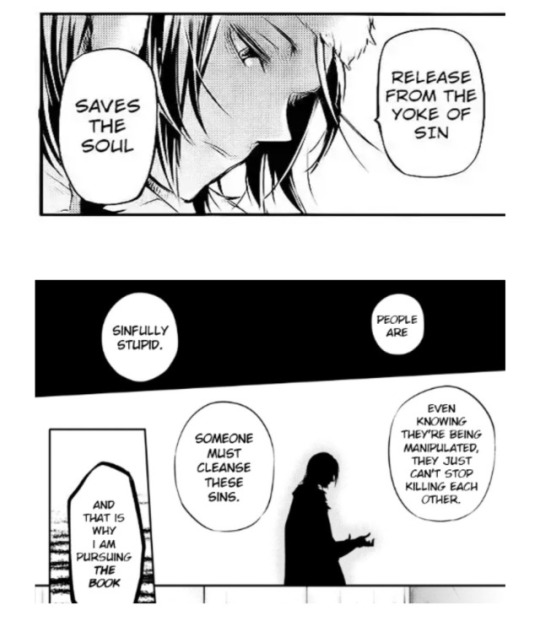
And if we follow Dazai as inspired by Yozo, then Dazai seems to be someone who still hasn’t found the “antonym to [sin]”, as we can see present in the novel:
“Actions punishable by jail sentences are not the only crimes [/sins]. If we knew the antonym of [sin], I think we would know its true nature. God . . . salvation . . love... light. But for God there is the antonym Satan, for salvation there is perdition, for love there is hate, for light there is darkness, for good, evil. [Sin] and prayer? [Sin] and repentance? [Sin] and confession? [Sin] and . . . no, they're all synonymous.
What is the opposite of [sin]?"
…
[Sin] and punishment. Dostoievski. These words grazed over a corner of my mind, startling me. Just supposing Dostoievski ranged '[sin]' and 'punishment' side by side not as synonyms but as antonyms. [Sin] and punishment - absolutely incompatible ideas, irreconcilable as oil and water. I felt I was beginning to understand what lay at the bottom of the scum-covered, turbid pond, that chaos of Dostoievski's mind - no, I still didn't quite see . . . Such thoughts were flashing through my head like a revolving lantern when I heard a voice.” - No Longer Human[40] (Yozo has in fact never finished this thought)
I think his desire to get rid of Fyodor could potentially be out of fear that Fyodor is right (this was my initial guess). Because in my opinion, despite how much Dazai wants to die, he also wants to find a reason to live desperately but if he cannot find it, then dying would be a better option, it is better not to live. And he is constantly afraid that he cannot find it even as he continues to live, but if he wants to live, then he must secure this (I think @/bsd-bibliophile speaks of it really well here). Because Dazai is a character filled with paradoxes, which I think is one of the reasons why it is so hard to grasp him, he is almost fickle, it is hard to say explicitly he is this way, he is that way. This is in fact very similar to Dazai’s writing, which I shall once again reference Studies in the Comic Spirit in Modern Japanese Fiction:
“Dazai himself was keenly conscious of what an imperfect vessel he was to present himself as a "model for the world," a model that offered no answers, full of paradoxes in a world full of paradoxes but not even aware of them. The act of becoming a writer, calling attention to the follies and deceits of the world, and presenting his own conspicuously imperfect life as a "model" would be a dubious proposition at best. Thus there is an inherent ambivalence to his role which, in his more dispassionate moments, is reflected in his work in the form of a highly ironic outlook, presenting the inevitable paradoxes as faithfully as possible, and then attempting to derive as much consolation as possible from the endlessly intriguing details of the show”[41].
Anyways, I have gone off track, or maybe, as we would see that both Dazai and Fyodor seem to understand fully that humans are “sinful and foolish”, they are both highly intelligent and I would say both seem to recognize their wrongdoings as well which cause some kind of self-hatred. And yet, from here their beliefs diverge, Dazai though hasn't found an antonym for “sin”, or that perhaps even realized that "living itself is a source of sin" [42], as in "sinning" is unavoidable or even maybe there's very little difference between other things and "sin", but once believed that Crime/“Sin” and Punishment are something close to antonyms but reality shows his thinking to be different, while Fyodor seems to see that punishment, getting rid of ability users, is the only way to get rid of it, though there's an extra dimension to it that he also has to become crime to punish it fully, I guess it's more so a cause and effect, antonyms and synonyms in his pov, so I wonder if part of that reason for his seeming desperate wanting to be rid of Fyodor also stemmed from fear, because Dazai could find himself picturing himself, or his past self, in Fyodor? Their thinking is quite similar... It may be just their understanding of "sin" that they differ in which caused their divergences.
So despite what he says, like the panel which inspired this essay, he is still unsure of some parts of it, but I think he is trying to convince himself of it, especially that last part. It's like he wants to believe it but cannot fully have himself do so.
I also do think that if the above is indeed what Dazai believes, the reason Dazai may be holding so tightly onto this belief, humans are sinfully foolish but what's wrong with that, even though he himself has yet to fully believe it may also be because of Oda’s last words: “To be on the side that saves people” and “People exist to save themselves” (an interpretation from @/bsd-bibliophile I like is even though what people are doing are motivated by their best interests it could also benefit those around them) and of course Oda’s trust, that even he who had done so much terrible things can possibly help and save people? And Dazai trusts Oda, even though he’s desperately holding onto them, because, though maybe one wouldn’t normally associate it with him but trust, to me, is a very crucial aspect to Dazai, a similar narrative is presented in his works as well, as probably symbolized during the Guild arc when he was holding onto the matchbox ‘advising’ Kyouka:
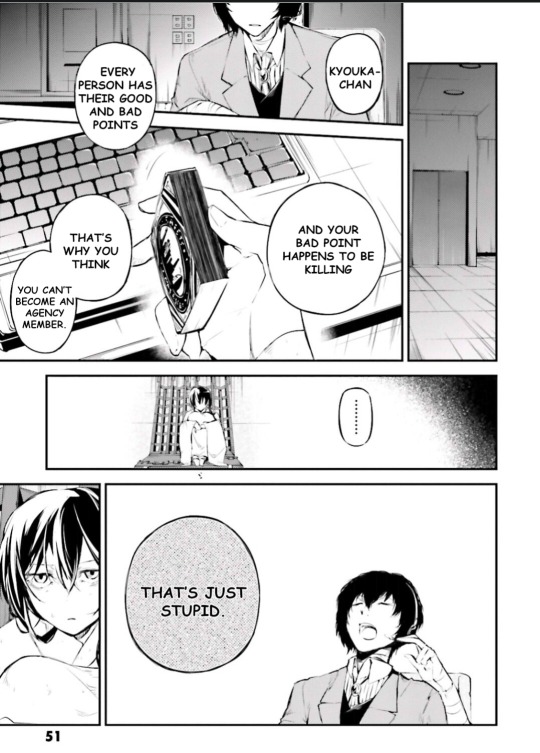

I also don’t think that if Dazai really fully believed what he said ("but what's wrong with that?"), when he asked how many people Kyouka killed, he would make this expression:

If you think about it, it almost feels like Dazai is repeating some of what Oda had implied to him on his final words to others. And maybe... Just maybe, Dazai's final evolution would be fully accepting that? Because if there is little difference between either good and bad things and "sinning", but you can help people along the way even when doing so by doing "good", maybe it's not so bad? Maybe it's a bit more wonderful.
But of course that's not to say that these words aren't sincere, because in a way they are, Dazai's whole character is a kind of struggle in my opinion, like that presented in so many of his works, it's like I want to believe it, but the world sometimes proves me differently, but I want to trust that what I feel deep inside is true, can I find it in myself to believe it? His words are sometimes in a way consoling himself and others.
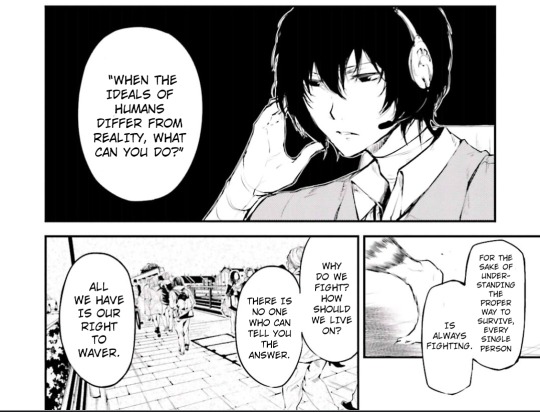
But understanding it this way then raises the question of what are abilities supposed to be/symbolize? What is the nature of abilities? Why do some people have it when others do not? Since we understand that there are people too in this bsd universe without an ability as well even though it focuses mainly on people with abilities. But why is Fyodor so intent on only getting rid of ability users? Why are the ability users the only ones with "sin"? I would say in contrast Dazai is more likely to believe that everyone harbors "sin" rather than just ability users, which parallels how I understand Dazai-sensei to think of "sin". This can actually perhaps be traced to the very subtle differences in what Dazai and Fyodor say in raw manga panels of chapter 46:
Fyodor: 「人は罪深く愚かです」
Dazai: 「...確かに人は皆罪深く愚かだ...」
With the character 皆 meaning all in Chinese. But of course I do not know Japanese, I can only guess the meaning Kanji characters if they are written the same as Chinese characters. But I also think the pause in the beginning of Dazai's sentence, hesitance perhaps, is also interesting to note.
And, of course, this is pure speculation on my part, these parallels are simply my own takes. I hope my thoughts here aren't too incoherent… but I am trying to interpret the author’s thoughts. I also wish I could add things about Dostoevsky’s works to this, but unfortunately, I have only finished reading one of his works (Notes from Underground) so far. But this is probably nothing but my best guess that I have about Dazai's character, as I had mentioned, this is merely a theory. Of course this is only my own way of thinking and understanding it. I think it helps make sense of some things, but of course it is but my speculation. But I think by understanding the source of BSD Dazai's inspiration, we may be able to potentially have a fuller understanding of his views, and perhaps where his arc is heading towards. That's why I always wished we could get even a glimpse at Dazai's thoughts... I know I probably have a very different outlook at Dazai from most people because of the fact that my understanding of Dazai is also influenced from how I understand his irl counterpart's works.
5. Final Notes
Honestly, this rambling has come to become way longer than I had originally intended… I honestly just really wanted to talk about my feelings for Dazai-sensei's works. But if nothing else had resulted from this essay, I hope that I could encourage or at least make more people want to read Dazai’s works because Dazai's works really do have a certain charm to them, I remember reading one analysis about how the use of words and changing perspectives, like going from the third point of view to addressing the readers with "you" can draw the reader in, there's also a certain sense of intimacy in his works... You know there's this one Chinese description from one of Dazai's books (小說燈籠 or in English Lanterns of Romance) that has always stuck to me:
對太宰治來說,這個世界沒有善惡,只有喜歡或討厭;人生未必無常,無非是喜劇或悲劇。而喜劇供給慰藉,悲劇予以救贖,都是亙古不變的心靈藥劑,療癒許多因戰亂而深感孤獨的哀傷靈魂。在太宰的故事裡沒有壞人,只有軟弱的人,但軟弱並非罪惡,正因為軟弱更能體會點點溫情。太宰總在內心痛苦、身感疲憊時,反而拼命製造愉快的氣氛。太宰本人,即是哀傷的喜劇。眾人以為他極度自私,事實上,他總顧慮著他人的感受。或許他認為只要帶給周遭溫柔,自己也能溫暖起來吧。[43]
Tr. For Dazai Osamu, there is no good or evil in this world, there is only like or dislike; life is not necessarily uncertain, it is nothing more than a comedy or a tragedy. While comedy provides consolation, tragedy provides salvation. They are eternal spiritual medicines, healing many sad souls who are deeply lonely due to war (A/N: did you know during the war Dazai wrote to console the hearts of people?). In Dazai's stories, there are no bad people, only weak people, but weakness is not a sin/crime, it is precisely because of weakness that we can understand tenderness. Dazai always tried his best to create a happy atmosphere when he was in pain and tired. Dazai himself is a sad comedy. People thought he was extremely selfish, but in fact, he was always concerned about the feelings of others. Maybe he thought that as long as he brought kindness to his surroundings, he would be able to warm himself up too.
And perhaps indeed weakness is not a sin, I like to think that is the main message of No Longer Human, as seen with the epligoue which has the woman calling Yozo a good boy and an angel, despite the fact that the entire novel seemed to have Yozo carry with him immense "sins" and guilt, in fact the majority of novel is ironic in that Yozo only recognizes his cruelty yet not his capacity for love and his gentleness, unreliable narrators... With the novel being one of fiction rather than autobiographical (it is semi autobiographical not fully) one must be sure to then take both Yozo’s narration and the words of the woman in the epligoue as Dazai. Maybe because Dazai thinks the best way for us to better human problems is perhaps to realize these human natures, these weaknesses which Yozo had been able to see in others and in himself, because perhaps only that way will we be able to cherish things such as kindness, trust, understanding, and treat others with these qualities. A note should be put in place for some historical context of No Longer Human which also influenced how I understand the book. Because No Longer Human is in fact a post-war novel, written after the Second World War which Japan was defeated. I have read quite a bit in Chinese about how Dazai felt people felt no remorse or sin from the war, here it writes that “When Dazai returned to Tokyo after evacuation, he was unable to hold himself back when he saw intellectuals depart the same leftist movement and cooperate with policies differing from their wartime policies, jumping on the wave of postwar democracy without hesitation. They had showed no remorse or sense of sin in committing the shameful act of converting and conforming to national policy.” I should also note that Dazai, in the past had been involved in communist activities, and the book Dazai Osamu says that one of Dazai’s ideals was service, to people around him and his readers. And what I had quoted before “those who are sinful have deep affection” is from a post-war work.
But I personally have a softer spot for his middle period works though (Dazai was in fact healthiest, and produced the most works during this period despite it being during the war, and he wanted to console the hearts of people during this time;;), which treat these problems with an almost gentler touch. I think within these works you'll find a different Dazai Osamu than what you've read in No Longer Human. Dazai seems to love and cherish warm and beautiful things and is always searching for them. Honestly, to me Dazai's works aren't just depresssing, it illustrates the human struggle, it's paradoxes, that is within everyone, the yearning for beauty, goodness, but also the melchony of the struggle as one comes into conflict with human's darker side and life's struggles, in so many dark moments, I always feel there is still a flicker of light, even if it is however faint, that is what Dazai is to me. And that's what attracted me to reading more of Dazai's work in the first place. Anyways no more, I'm done talking. So, to end, let me leave you with one of the Dazai quotes I love:
「就算我不再了也不要沮喪,要相信我一定會成功,請輕鬆看待。我絕不會自甘墮落,一定會戰勝這個世界。」- 《正義與微笑》[43]
tr. “Even if I am no more, do not be depressed, believe that I will succeed, just wait and see. I will not willingly fall into deprivity I will succeed in this world.”
6. Citations:
[1] Dazai, Osamu. No Longer Human. Tr. Donald Keene.
[2] Dillon, Sara Ann. Dazai Osamu and the problematics of context in Japanese artistic consciousness. Stanford University ProQuest Dissertations Publishing, 1988. 8906653.
[3] Cox, Jamie Walden, "Dazai's Women: Dazai Osamu and his Female Narrators" (2012). Dissertations and Theses. Paper 132.
[4] Ueda Makoto, Modern Japanese Writers and the Nature of Literature.
[5] Ibid.
[6] Dazai Osamu. Otogizoshi: The Fairy Tale Book of Dazai Osamu, Tr. Ralph F. McCarthy.
[7] Cox, Jamie Walden, "Dazai's Women: Dazai Osamu and his Female Narrators" (2012). Dissertations and Theses. Paper 132.
[8] Watabe Yoshinori, “Osamu Dazai and the Beauty of his Literature”.
[9] Dazai, Osamu. No Longer Human. Tr. Donald Keene.
[10] Hijiya Yukihito (1974) A Religion of Humanity, Critique: Studies in Contemporary Fiction, 15:3, 34-42, DOI: 10.1080/00111619.1974.10690061
[11] Ibid.
[12] 蔡超, 「《人間失格》與太宰治的基督教思想」
[13] Watabe Yoshinori, “Osamu Dazai and the Beauty of his Literature”.
[14] Ibid.
[15] Ibid.
[16] 太宰治, 《思考的蘆葦》, tr. 劉子倩
[17] Watabe Yoshinori, “Osamu Dazai and the Beauty of his Literature”.
[18] Dazai, Osamu. No Longer Human. Tr. Donald Keene.
[19] Hijiya Yukihito (1974) A Religion of Humanity, Critique: Studies in Contemporary Fiction, 15:3, 34-42, DOI: 10.1080/00111619.1974.10690061
[20] Dazai, Osamu. No Longer Human. Tr. Donald Keene.
[21] 太宰治, 《正義與微笑》, tr. 高詹燦
[22] Dazai Osamu, Self Portraits, “Thinking of Zenzo”, tr. Ralph F. McCarthy. [via. BSD-Bibliophile].
[23] Ibid.
[24] Ibid.
[25] Dazai Osamu, Blue Bamboo, tr. Ralph F. McCarthy. [via. BSD-Bibliophile].
[26] Ibid.
[27] Ibid.
[28] Ibid.
[29] 周希瑜,戴松林, 論太宰治《清貧譚》與《竹青》中浪漫主義
[30] Dazai Osamu, Blue Bamboo, tr. Ralph F. McCarthy. [via. BSD-Bibliophile].
[31] Dazai, Osamu. No Longer Human. Tr. Donald Keene.
[32] Cohn, Joel R, Studies in the Comic Spirit in Modern Japanese Fiction, “Dazai Osamu: Laughing at the End”, Harvard University Asia Center, 1998
[33] Ibid.
[34] O'Brien, James A. "Conclusion." Dazai Osamu, Twayne Publishers, 1975, pp. 150-163. Twayne's World Authors Series 348. Gale Literature: Twayne's Author Series
[35] Ibid.
[36] 太宰治, 《思考的蘆葦》, tr. 劉子倩
[37] Dazai, Osamu. No Longer Human. Tr. Donald Keene.
[38] Hijiya Yukihito (1974) A Religion of Humanity, Critique: Studies in Contemporary Fiction, 15:3, 34-42, DOI: 10.1080/00111619.1974.10690061
[39] Dazai, Osamu. No Longer Human. Tr. Donald Keene.
[40] Ibid.
[41] Cohn, Joel R, Studies in the Comic Spirit in Modern Japanese Fiction, “Dazai Osamu: Laughing at the End”, Harvard University Asia Center, 1998
[42] Dazai, Osamu. No Longer Human. Tr. Donald Keene.
[43] 太宰治, 《小說燈籠:冷冽中的溫暖組曲,太宰治浪漫小說集》, tr. 陳系美
[44] 太宰治, 《正義與微笑》, tr. 高詹燦
A/N: I forgot to add a few citations, one is for the No Longer Human isn’t an I-novel thing: Japanese Language and Literature Vol. 53, No. 2 (October 2019), pp. 299
For those who are curious as to why it isn't one, the definition of an I-novel according to Wikipedia is "The I-novel (私小説, Shishōsetsu, Watakushi Shōsetsu) is a literary genre in Japanese literature used to describe a type of confessional literature where the events in the story correspond to events in the author's life." Though NLH does follow some of Dazai-sensei’s life experiences, from what I read it said the way is structured and the degree of which it manipulates Dazai's own life events makes it more fictional. This whole thing may perhaps be a scholarly debate honestly... (But Donald Keene, Ralph McCarthy and James O'Brien all seem to suggest the same thing as this source so... But if you think about if this is true, I am only in more deep admiration for Dazai's writing) But I'm personally more inclined to think that there is a creation of a almost distance between the author Dazai and the "Dazai" he shows in writing, though sometimes in some stories the main character are even referred as "Dazai" (like Thinking of Zenzo for example), but even so you can still feel Dazai through the pages, it comes across as him being personally involved in them and it makes them quite fun to read, I think it's truly fascinating but that is my unprofessional opinion. But if you think this is exasperating, yes perhaps it is indeed... In the book Dazai Osmau, the author even mentioned how certain critics are exasperated by Dazai’s coyness lol. If I have sparked curiosity about the subject, I have written more in depth about Dazai-sensei's narration here.
Canis Familiaris:
Dazai Osamu, Self Portraits, "Canis Familiaris", tr. Ralph McCarthy.
The Setting Sun:
Dazai Osamu, The Setting Sun, tr. Donald Keene.

Tag list: @REQUIEM626K @shadyteacup @ALITTLESIMP @greenshirtimaginesii @JADEGREENIMMORTALITY @SAKIKOSHI @KENMASBBYGRL @DAZAISUSEDBANDAGES @JESSBEINME15 @MIKASA-STAN-ACCOUNT @MISSROWN @GINSWIFE @TENDER-ROSIEY @SONDER-PARADISE @DARLINQSERENITY @WHOREFORDAZAI @SHAMELESSPASTAWOBBLERLAND @RIRK-KE @DAZAIAIKO @HANEMISO @SEBTOMM @IZUKUS-GF @LAVIDADELAVIE @SWRDEMON @ARIXSUX @BEAUTIFUL-IS-BORING @ATSUCAFE @SIGMAFIED @STORIES-FROM-SAINT-PETERSBURG @THEKAYLAHUB @XO-CUTEPLOSION-XO @SIMPLYASIMPSBLOG @KISARA-16REBLOGS @STRAYDOGSBUNGOU @TITAMAOW @KAUS-QUIETIS
Analysis only:
@ODDEYESIGHT
#kat rambles about dazai sensei#kat's analysis🔍#bungou stray dogs#bsd dazai#bsd#dazai osamu#bsd theories#bsd analysis#bungou stray dogs analysis#bsd meta
191 notes
·
View notes
Text
The Growing Divergence of Fyodor and Dazai
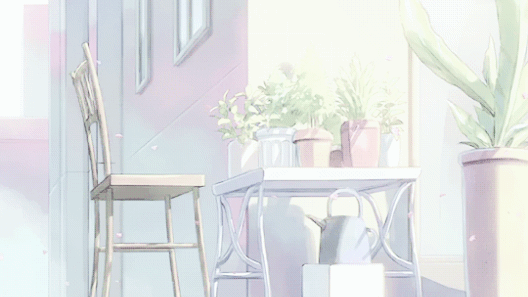

Summary: The interactions between Fyodor and Dazai in relation to seeing a growing difference in Dazai and Fyodor's characters. In their view of humanity and how they strategize, and connections to some aspects of the DOA arc, it may inform us about what may be expected in the prision break out arc, and make sense of their respective strategies in Chapter 97.
Warnings: Spoilers for post-canibalism arcs (the manga) and Dead Apple
A/N: Knowing the bsd fandom, I'm quite certain that some of what I have analysed probably has been done by some others before me, but my dearest friend @n1kolaiz convinced me to write his so, here are some of my thoughts :)
Also thanks to @n1kolaiz and @alittlesimp for discussing the manga with me and helping me come to this idea; credit for the translations of manga panels goes to @czkkn-upload and Dazaiscans


1. The similarities between Dazai and Fyodor
1.1 How other characters view Dazai and Fyodor
1.2 How Dazai and Fyodor view each other in terms of similarities
2. The Differences in how Dazai and Fyodor view humanity
2.1 Dead Apple
2.2 Cannibalism Arc
2.3 Decay of Angels Arc
3. Insights on Manga Chapter 97 and final thoughts
I had only recently been caught up with the recent arc, and of course, I have been aware that quite a lot of fans have been finding the plot a bit stagnant in its development. I, myself have been seeing a difference in the current arc’s focus too in comparison to the others. Especially with the shift in its focus from one being character-driven to one more plot-driven. I personally would be lying if I were to say that this change did not puzzle me. However, I still feel that there are some connections to the series’ previous developments, in particular the main source of this stagnation -- with Dazai and Fyodor, so I thought I’d put down some of my personal thoughts. And I believe that this arc continues, as had in previous arcs and interactions between the two, a growing difference the can be found between the two characters, a clearer indication of their respective views on humanity, and perhaps comments on the unpredictability of human kind. So, shall we begin?
1. The Similarities Between Fyodor and Dazai
I personally believe that it has long since been established that Fyodor and Dazai act as foils for each other in BSD. For those who are unfamiliar with the term, a foil in literature is a character who is contrasted with another character, in order to highlight or differentiate certain qualities. Over the course of their interactions with one another, we have begun to see how similar the two of them are, in aspects such as their intelligence, their way of thinking and their (once) common sense of boredom with people.
In fact, these similarities are so obvious that both the characters themselves, as well as characters around them had commented, either directly or indirectly on such. And though this notion is perhaps rather obvious, let us use this to review them.
1.1 How other characters view Dazai and Fyodor
“Devils”, “aliens”, “monsters”, “demons”. Since the two of the characters have been introduced, and placed next to one another, we have well been made aware of their similarities, and it is often that we see these two grouped together with such terms. This is especially so during their encounter in Dead Apple, and in the current arc.
Beginning with that of Dead Apple, in the epilogue, we saw Ango describing the two of them, along with Shibusawa. Each of the three, as described in the novel, had “a mind so extraordinary that [they] seemed almost alien”, and he commented, and seemed sympathetic of how lonely and isolated being one of them may feel. This feeling of course, had been present in Dazai’s own past, and had been especially clear during his time in the mafia.
During the current arc, with a closer proximity between the two characters, having gone to jail, we have a wider view of how the other characters view these two “demons”. This opportunity in itself is not a usual one, nor one in which we would easily be able to view with the previous arcs or developments. In the manga itself, even Dazai himself also commented such “that’d definitely be impossible without a chance like this” in Chapter 64.
For one, during this arc, we are once again given awareness to the similarities in their intellect. Even Ranpo had commented that going up against Fyodor’s plans “almost feels like going up against Dazai”. During their time in prision, we are once again reminded of it, and how in sync they are with each other when we found out in Chapter 74.5 that they are speaking in their own language or code which they put together from past conversations. I also quite like how this panel was depicted with a line passing through the two of their minds, further emphasising this point.
Their profiles too, especially emphasised by the fact that they are wearing the same clothes, show almost something similar to a reflection as the two are placed next to one another like this.
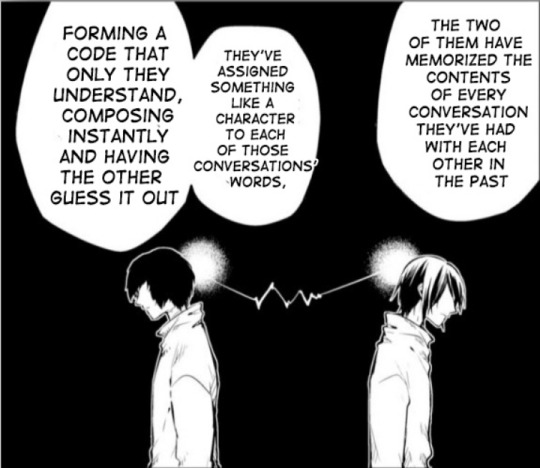
1.2 How Dazai and Fyodor view each other in terms of similarities
Of course, not only other characters have recognized this level of similarity, the two “demons” themselves have too. This has been explicitly shown during the cannibalism arc when the two of them had met, and during the course of the arc itself as well when attempting to figure out Fyodor’s plans.
With Dazai claiming multiple times that he had predicated or at least guessed what Fyodor’s actions entailed based on how he would have acted and what he personally would have done when placed in a similar situation. Especially nearing the end of the cannibalism arc this is further highlighted when Dazai was tasked with the act of figuring out in which way Fyodor was supposedly going to escape, and when asked for his reasoning, Dazai merely answers with, that was what I would have done. Showing how closely their way of thinking really is.
Their recognition of each other’s intelligence especially, is once again shown during the Decay of Angels arc. Beginning from the moment Dazai had entered jail, and had successfully stopped Fyodor’s attempt to kill Fitzgerald, each move that the other had done has in one way or another been stopped by the other. From this moment, to the Sky Casino arc, to when Fukuchi had gotten ahold of the weapon, demonstrating just how they each cancel one another out, therefore making the plot as of this moment rather stagnant. And even when the other had figured out their plans, the other doesn’t all seem surprised. This can be seen in the Sky Casino arc especially, during Chapter 72, when Dazai had commented saying that he had though that Fyodor had already figured out who the queen is. The two of them continue plans, expecting the other to figure it out (quite scary if you ask me).
In additon to such showing this point, Fyodor and Dazai too in this arc had also explicitly recognize each other as someone close to equal. For example, in Chapter 64 Fyodor invited Dazai for a discussion, one that he deemed impossible unless his partner had an equal intellect to his own. And Dazai during Chapter 77, when he grouped himself with Fyodor as a person who schemes rather than being one of the people he sees as making “the world turn”.
2. The Differences in how Dazai and Fyodor view humanity
But of course, despite how similar the two characters are, being foils, there must be something, even a single factor that differentiates them. And one of the main differences in their respective views on humanity.
Though the two of them had both felt a sense of boredom with life, as they found it predictable with their intelligence. And both of them agree that humans are “sinful and stupid”, yet their views are separated here. While Dazai finds interest and had discovered unpredictability in humans, with Oda’s help, and I also personally believe with Atsushi as well, and has a sense of fondness for humanity or at least some people; Fyodor feels the opposite, seeing them as boring and predictable, and one that should be destroyed and “cleansed”.
And thus I will be examining this view of theirs in their interactions in Dead Apple, the Cannibalism Arc and the Decay of Angels Arc.
2.1 Dead Apple
Being completely honest, Dead Apple’s plot somewhat confuses me. But all analyses on the light novel/movie aside, when we look at it as a whole, quoting Ango’s words “if we ignore all the schemes and trickery aside, this may actually be a surprisingly simple case... Perhaps they wanted to see what [Shibusawa] would do and how he would meet his demise... or perhaps how he would be saved”. After examining the movie a couple of times, and reading some analyses, and I am hoping to read the light novel next, the plot of Dead Apple may actually be a source used to closely examine Dazai and Fyodor’s own intentions behind their actions, and may give some insights into the current arc and chapters as well.
In a way, Dead Apple is quite interesting in how both Dazai and Fyodor are attempting to lead Shibusawa into seeing their own view of humanity and life. Similarly to the two, expressing a great boredom of life, due to the fact that he feels that nothing surpasses his expectations, he is filled with a yearning for something to fill a certain emptiness in him (quite similar to Dazai in the mafia). And therefore, he uses his ability and collecting abilities as a way to fill his boredom. In this sense, he differs from both Fyodor and Dazai in the way he passively allows himself to be alienated, while Dazai and Fyodor both take actions in order to solve this problem of theirs. This is to say, Shibusawa is almost like a blank slate in which the two can put their views on, and in a sense attempt to lure him to see their own view, and see which side he would end up on, just as Ango had implied.
Dazai, when he had talked to Shibusawa briefly commented that he once filled bored too, and suggested that he was in need of “salvation” by an “angel” which we later understood referred to Atsushi. And with Shibusawa finding himself no longer feeling bored during his battle with Atsushi. One couldn’t help but wonder if this is a indirect presentation of Dazai’s own view on humanity, especially when he had commented that he hoped Shibusawa managed to fill his boredom and lonelienss -- that though perhaps life is boring, there are some people like Atsushi who exceed their expectations, and make things, if not, a little more interesting.
While on the other hand, Fyodor continued to hold onto the view that people in their sinfulness must be destroyed. Showing him his past, giving one of the things which he so desired, he encouraged Shibusawa to in a sense adopt his own views on life, to “eat, howl, make violence as [his] instinct desires”, using human’s own weakness to eradicate other humans (Now that I think of it Shibusawa and Sigma are quite similar in being used by Fyodor in this way). But of course, that is how I see it, again giving a passive view to the audience their own thoughts about humanity.
2.2 Cannibalism Arc
Unfortunately, in this arc alone, we do not see to much of their views being shown. With them being on opposite sides, and at a distanced place from each other the majority of the time, it makes it rather difficult to compare them. With exception to the scene in which Dazai said "humans are sinfully stupid, but what's wrong with that?"
When I had originally saw this scene, I had thought a lot about it. But in essence, Dazai’s view remains the same as what he had shown in that of Dead Apple. That though people can be sinful and foolish, they make mistakes and are not perfect, but that doesn’t mean that they aren’t interesting, that they are not good as they are, and he is fond of them.
In a way, this actually reminds me of Dazai-sensei’s own works which he expresses his views on humans, with a certain fondness, despite his understanding of how artificial and horrible they could be as he expressed in No Longer Human. This can be examined in No Longer Human, The Setting Sun, his short story “Run, Melos!”, all of which I had examined in a different analysis. But also some of his other short stories such as “Thinking of Zenzo” in Self Portraits, and one of the works of his that I have recently been reading “Urashima-san” in Otogi-zōshi, in which the protagonist despite finding the people on land being too judgemental of one another, after being seperated, he couldn’t help but feel an affection for them, and find them even more beautiful than ever (but this is only a rough translation from my native language).
Anyways, this view of humans thus allows us to understand a bit more of why they act the way they do, why Dazai is able to befriend people even though the other person may not have his intelligence, because they intrigue him, and they are able to understand them a little, like Oda and perhaps Atsushi and even Chuuya. While Fyodor, only finds companionship or something akin to it in Dazai as seen in Chapter 64, due to their different views, perhaps he didn’t see the point in it.
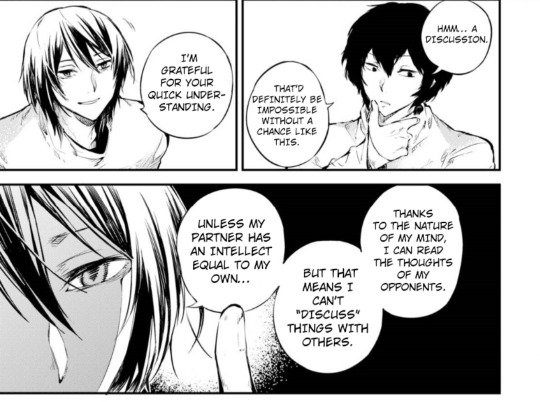
2.3 Decay of Angels Arc
The topic of humans being sinful and foolish is once again brought up in the current arc. However, in this arc, we see an additional statement to what Dazai had previously said about humans: “they’re not such boring beings as you think”.

Even in the moment of this panel, Fyodor maintains his view that humans are predictable. Commenting that it had been written into the page that the Hunting Dogs and the police wouldn’t believe that the ADA is innocent. In a way, Fyodor is asserting his view that humans are predicable and boring, expressing that just because that was what was written into the page, people will then follow suit. That’s why Dazai expressed that Fyodor “didn’t understand god one bit”, because he sees, perhaps, that humans, everyone of them including the two of them, are illogical, inconsistent, self-contradictory beings, unlike what Fyodor seems to believe, they are not entirely predictable, nor are they boring.
And following this having Tachihara, as well as some of the policemen going against what was written in the page. These acts in itself, though perhaps passive, are literally going right against Fyodor’s views and beliefs. The beginning of a downfall of his views on humanity as what they do is slowly going against what he thought would happen.
In addition to showcasing more of the differences in their views, as well as Fyodor’s understanding of humans being defeated somewhat indirectly. This arc also prepares us for the coming chapters as we begin the prison break arc as it gives us a greater insight into how they strategize and their respective manipulation methods. Such can especially be seen during the sky casino arc and during Dazai and Fyodor’s discussion.
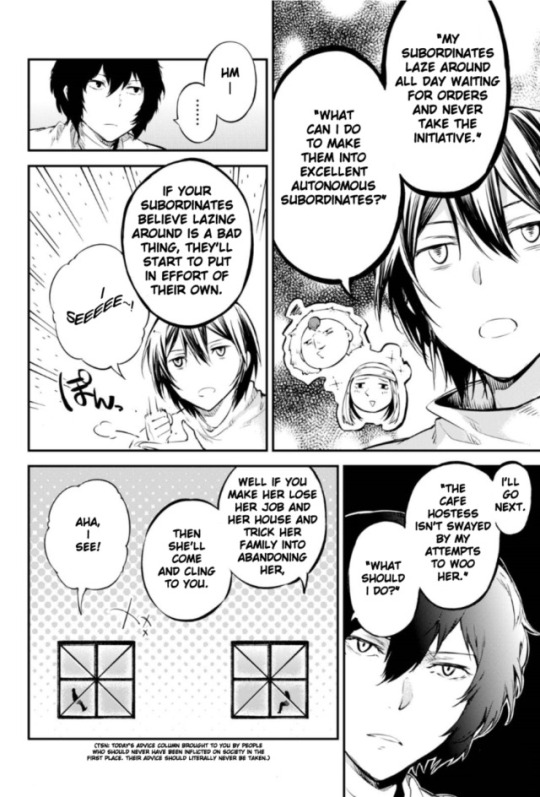
I think @/blackandwhitemusician had explained here really well in this post of theirs, but I would also like to add a bit of my own thoughts, especially about Fyodor. As they had written in their analysis, Fyodor and Dazai seem to be discussing how each other’s plans operated. And it is true, and we also seem to get a better understanding about how they view people as well.
In Fyodor’s strategies and planning, he always created them meticulously, pulling the strings and manipulating everything to a tee. He is orchestrating from behind, and there is almost nowhere for the people in his plans to escape from his strings (which reminds me of this official art in the cannibalism arc). This is why his subordinates in a sense “don’t take the initiative” and are not “autonomous”. This way of strategizing can again, actually be seen as another extension of his own view on humanity, that people will always do and go as he predict them to. This may also be why he may take some important tasks into his own hands, and thrives in isolation, perhaps in a way he doesn’t trust other people to be capable enough? Maybe that can explain why Fyodor had also planned to eliminate Sigma during the Sky Casino Arc as well. And also why he seems to fail in situations in which he underestimates the potential of Dazai’s comrades.
While Dazai differs in this, I believe I have seen a few people talking about this before too, but Dazai’s strategizing mostly involves a sense of mutual trust. He has enough trust in their abilities to do what he predicts them to be able and capable of doing, which too can be seen in the sky casino arc. But at the same time they also have a sense of trust in him, that Dazai knows what he’s doing and his planning will turn out as he plans it to be. This too is indirectly related to their views on humans as well. in a way he believes in their abilities to act in a certain situation that perhaps that even he cannot be certain what will happen, this is best shown in Dead Apple after Chuuya had saved him -- “I had predicted this far, but the rest is up to them”. And it is interesting that in the panel above Dazai’s question prompted an answer from Fyodor which as @/blackandwhitemusician wrote is him testing how Fyodor got his subordinates, through luring them with offers when they are ‘weak’, which is quite different from Dazai’s method which involves more trust in people.
3. Insights on Manga Chapter 97 and Final Thoughts
So how does all this connect to the recent chapter?
I feel like what each of them had chosen to help them escape in this new prison break arc can also be tied back to their way of strategizing, and perhaps the reason why they chose their respective “weapons”, thus their respective views on humanity. But of course this is only my personal opinion.
As I had mentioned earlier, Fyodor thrived in isolation and independence, he takes things into his own hands most of the time, and it is not too much of a surprise that he chose the security card. All the other items in a way seem to in a sense will entail the involvement of other people.
Yet, Dazai surprised everyone by choosing Sigma instead as his “weapon” to help him escape. Of course, we cannot take away the option that Dazai had at the beginning wanted to chose the security card as well, but it seemed to me that there was no hesitation when he had chosen Sigma, whereas in contrast we saw Fyodor take a moment to think about his options. So it comes to the question, what is Dazai trying to do? What is he thinking?
Though I cannot be certain what he is thinking, but I do feel that it might have something to do with this:

“When you and your enemy share the same amount of intel, the side that does the unexpected wins.” This panel is from the guild arc, but when examining it in this exact situation, it seems fitting. Since in this current arc, both Fyodor and Dazai have the same amount of information on what their escape route entails from what Nikolai had said. So I would guess that in order for them to “succeed”, this death match would possibly be a game of trying to be as unpredictable as one could be.
The act of choosing Sigma itself is already in a sense unexpected, we see both Nikolai and Fyodor (for once) shocked. But then it occurred to me, with how similar Dazai and Fyodor’s way of thinking, surely Fyodor must have realised that Sigma was a possible option to choose from, right? Then, with inference to the best explanation, maybe what had surprised Fyodor wasn’t that Fyodor didn’t think of choosing Sigma, but that Dazai had chosen Sigma even though he realized that it was a possible option.
Linking back to how I have explained their separate views on humans, their options make sense. Fyodor, with his views that other people are merely predictable and boring, and in a sense tools to do something, even if he were (let us say that he didn’t think of doing so) to say knew that choosing Nikolai or Sigma was an option he could take, he wouldn’t have done it. He doesn’t see the point in it, not when he could do it himself and perhaps more efficiently, maybe he would see having another person with him as being bothersome.
But Dazai sees people differently. To begin, already knowing that he could trust Sigma, since he had helped Atsushi in the previous arc. Along with the fact that he sees the potential in other people to succeed his, and even Fyodor’s expectations, he may be the perfect element for “unexpectedness” that Dazai needed. Besides, Dazai is much more practical than Fyodor in using other people and their abilities in his plans, though his way of planning does not seem as meticulous and detailed as that of Fyodor’s, when it comes down to it, they are much more prepared for when sudden changes happen.

Additionally, previously Dazai had described that he and Fyodor are schemers, they are not the ones who could “make the world turn”, they are observers in the world, looking at it, he recognizes that. But even this panel shows us, Sigma is not like Dazai and Fyodor, he is one of those people who could “make the world turn”. And I wonder in this arc, if Sigma would be a representation of the humanity of which Fyodor is so critical about, and that through maybe through how he observes Dazai’s plans unfold, he can see before him that perhaps his beliefs are not right. But of course, all of this is but my own opinions.
Therefore, with what I had observed above, I personally I see this death match between Dazai and Fyodor as not only a battle of intelligence but also one of their beliefs and views, and a chance to better understand the characters themselves, as well as more on how they differ from one another. In addition to such, I am hoping that we will be able to see an even greater divergence as their differences become more obvious. As I had mentioned again and again before, they have a very similar way of thinking and this is an opportunity like no other that we get to see how they will slowly, in this arc, diverge from one another, as they would have to do so in order to get ahead of the other. And then, we can see into both of their characters through this with an even greater depth, fingers crossed that we will get to see more of Fyodor’s character.
Personally, I am also hoping that Fyodor will begin to doubt his own beliefs as he begins to see that he is wrong about his view on humans. It would be quite an interesting for Fyodor. And I also want to share this theory about why Sigma may be the only one who can led Fyodor to question his own beliefs since I really enjoyed it by @/fyodcrs. But we can only wait and see.
Comment here to join my tag list! Current list: @requiem626k @shadyteacup @alittlesimp @greenshirtimagines @jadegreenimmortality @sakikoshi @kenmasbbygrl @dazaisusedbandages @jessbeinme15 @mikasa-stan-account @missrown @ginswife @tender-rosiey @sonder-paradise @internetkilledtheroxstar @n1kolaiz @whorefordazai @shamelesspastawobblerland @rirk-ke @dazaiaiko @shinscig @sebtomm @izukus-gf
#bungou stray dogs#bsd#bsd meta#bsd theories#bsd analysis#bsd dazai#bsd fyodor#bungo stray dogs#bsd manga spoilers#bsd manga#bsd anime#anime analysis#manga analysis#bsd sigma#bsd nikolai#kat's analysis🔍#q
461 notes
·
View notes
Text
BSD (Manga) Outfits -- Contrasts and Patnership
feat. Kunikida and Dazai; Chuuya and Dazai


Quite some time ago, I had talked about Atsushi and Akutagawa's outfits in the anime and how, with its colour schemes symbolizes how they act as foils for each other. And I just found it quite interesting how this applies to Kunikida and Dazai, as well as Dazai and Chuuya as well, highlighting how they help to balance one another out.
And this can especially be seen during the first scene in which they were put next to one another in a close setting.
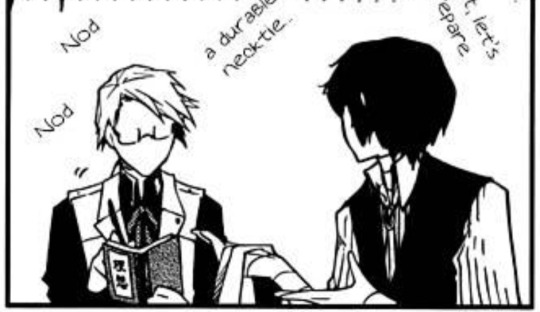
When I was rewatching this scene in the anime, there were times when I wondered why Dazai was depicted here without his coat? But actually when put right next to Kunikida as seen in this panel right above, it seems to showcase a perfect contrast between the two's outfits.
Without his coat, the rest of Dazai's outfits actually look surprisingly similar to that of Kunikida's. Both of them wear a vest, right over a shirt and on top of that a tie; well a bolo and ribbon tie respectively. But not only that, the colours for each of these clothing pieces are exactly contrasted with each other (And would you look at that their hair too).
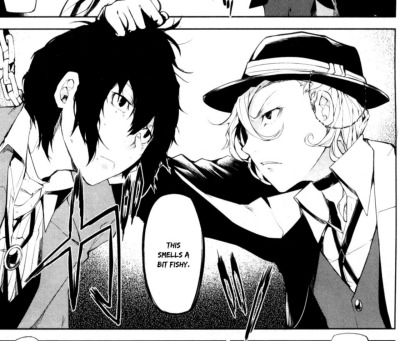
The same goes for Dazai and Chuuya as well. When put this close to one another, their respective outfits also seem much more similar than they do initally. And the colours (the vest, the coats, the neck 'accessories') too perfectly contrast one another. And though there are elements in their outfits that are of the same colour, such as their ties(?) and shirts have elements and patterns that differ them apart as well.
When I had been reading I couldn't help but think of this. And wonder if this is a device used to foreshadow, in later chapters, how they perfectly balance each other out especially in combat and help each other where the other is lacking. Or perhaps I'm just overthinking.
85 notes
·
View notes
Text
Dazai’s Search for Genuineness, Trust and Humanity Part 2


My personal interpretation and understanding of BSD Dazai using Dazai-sensei’s works and some of his background information
Works discussed: No Longer Human, The Setting Sun and Run, Melos! <spoiler warning> Also spoiler warnings for Season 3
These are just my personal thoughts on Dazai, I would love to hear your thoughts as well! Also please note that I have yet to read the manga or the light novels, so I will only discuss the anime
This is part 2 of this analysis
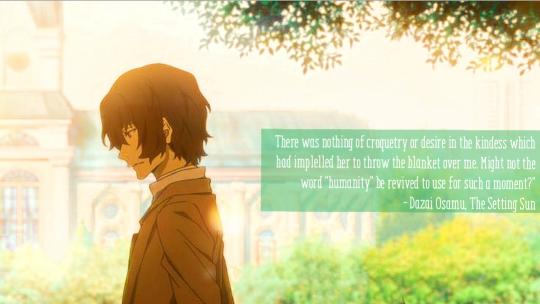
In this series of analysis, I will discuss my belief that Dazai yearns for genuineness and trust from others, whilst being untrusting of the world/society. And his search for humanity within this “sinful” world
In this analysis I will showcase more evidence on the fact that Dazai wants and looks for these things in the world.
2. Dazai’s desire for trust and genuineness in the world
2.1 Examining such through his works
2.2 Dazai-sensei’s background
2.3 Connection to BSD Dazai and Atsushi
In the first part of this analysis I, through Dazai-sensei’s three works, discussed the reasons and evidence for Dazai’s distrust towards the world, and had implied through what he was searching in the port mafia to explain that he perhaps is in search for genuineness and kindness in humanity.
2. DAZAI’S DESIRE FOR GENUINESS IN THE WORLD
However is this true? In this part I will give more evidence to support this statement, as throughout Dazai-sensei’s works, we can actually see that despite his dark view of the world, there are still hints of hope and love for this world in his texts. Despite all, he still loves humanity despite its flaws and shortcomings, which I always found very interesting and enlightening.
2.1 Examining this desire from Dazai-sensei’s works
//Run, Melos! (1940)
As mentioned in my previous analysis, Run, Melos’s central conflict was based on the distrust of the king. So I’ve looked into this short story by Dazai-sensei a bit more and found out that it was a rewrite of an Ancient Greek legend of Damon and Pythias from the 4thcentury B.C. According to this academic journal, “the legend represents the perfect friendship of a man sentenced to death who wants to delay the execution and be released for the time, and a man who becomes a hostage as a guarantee for his friend's return.” And despite all the troubles and doubts, his friend had complete trust in the accused of getting back in time. Which he did in the end, and moved the king.
[Adding to Part 1] After reading through it, I could tell that Dazai-sensei had most certainly passed his own feelings into this story. For one, in the original version of the short story, the distrust of which the king held was not as explicitly stated as in Dazai-sensei’s short story, with only the indication of it through one quote:
"How can I know that you will keep your promise?" he said. "You only want to cheat me, and save your-self."
- James Baldwin, Damon and Pythias
And throughout Dazai-sensei’s version of the short story, he closely examines the struggle of man (symbolized by Melos) to keep their promises, in this case to return to the king’s castle by sundown on the third day to save his friend. Along with the difficulty his friend faced to actually be assured that Melos will return in time before his execution, which is a strong exhibition of the fact that Dazai-sensei doesn’t believe that the story told in the original version would fit in real life.
[Part 2] So how does this showcases Dazai-sensei’s desire for trust despite his crackled view of the world and those that reside in it? Well, it is none other than the fact that Dazai-sensei kept the happy ending of the short story. In the short story itself, he also praised trust, as well as the genuineness of the friendship between the men, despite the friend’s doubts, despite Melos’ attempt to almost give up on saving his friend.
“Your wish has been fulfilled. You have subdued my heart. Trust between men is not just an empty illusion. I, too, would be your friend. Say you will let the league of love be three.”
- Dazai Osamu, Run Melos!
Moreover, what had always struck me when reading this short story was this line
“Someone waits for me. Patiently, never doubting me, he waits for my return. I have his trust. My life? It counts for nothing. But this is not time to seek forgiveness with my own death. I must prove worthy of this trust. That, for now, is everything.”
- Dazai Osamu, Run Melos!
Which once again showcases how important the concept of trust seems to be to Dazai-sensei. This could be connected to, as mentioned before, Dazai-sensei’s many ‘betrayals’ he had experienced throughout his life, whether that be from his expectations towards the world or people. And yet, he still gave a story about this topic a happy ending... Perhaps this is a hint at his yearning for such things: a sense of trust even to some degree (as he knows, despite all humanity cannot be completely trusted), and a genuine bond between two people and desire for others to place trust in him as well.
//The Setting Sun (1947)
As I mentioned before, The Setting Sun is written by Dazai-sensei in a time when he seemed to be disillusioned by how the Japanese acted (without guilt or remorse for what happened) after the war, and only thinking for themselves.
And with this view of humanity, it is very clear from the tone of Dazai-sensei’s writing in The Setting Sun, that is exhibits a darker and even more distrustful tone of humanity. And even in this time and mindset, Dazai-sensei’s writing still mentions with an almost romantic tone about those who are genuine and truthful.
Such “romantic tones” can be examined when Kazuko and her brother describes their kind and gentle mother; as well as when Naoji describes the woman whom he fell for, Suga.
Kazuko and Naoji’s admiration for their their mother’s genuineness can be viewed as early on as the first chapter, in which Kazuko the way in which her mother drinks her soup:
“The real aristocrats don’t put on silly airs like that in Iwashima. Mama is the only one in our family. She’s the genuine article. There’s something about her none of us can match.” (Dazai 4)
“This may not be the way of eating soup that etiquette dictates, but to me it is the most appealing and somehow really genuine.” (Dazai 5)
- Dazai Osamu, The Setting Sun
And similarly near her mother’s death Kazuko says this about her:
“I thought that Mother might be the last of those who can end their lives beautifully and sadly, struggling against no one, neither hating nor betraying anyone.” (Dazai 124)
- Dazai Osamu, The Setting Sun
Such high regards that Dazai-sensei has his two main characters hold for their mother because of her genuineness, the fact that she doesn’t hide who she is, clearly displays that perhaps he himself puts such things at a high regard as well. This is perhaps because he knows just how deceitful the world could be, and these things are rare and therefore should be treasured.
Similarly, Naoji also praised highly and fell in love with this woman Suga because of her “unguarded expression of honesty”. The fell in love with the fact that
“There was nothing of coquetry or desire in the kindness which had impelled her to throw the blanket over me. Might not the word ‘humanity’ be revived to use of such a moment?” (Dazai 164)
- Dazai Osamu, The Setting Sun
And as we can see once again exhibiting his love for such things in human beings. After all, even in The Setting Sun itself, Kazuko had expressed that “such innocence really charms me” (Dazai 7), perhaps hinting that he is drawn to such characteristics in people, in humans within this deceitful and depraved society. And through looking at the amount of times he had praised such attributes in his work, maybe this is truly Dazai-sensei himself speaking.
//No Longer Human (1948)
TW One Rape Mention
This longing of wanting such can also be viewed in No Longer Human as well. Although in the book, Yozo (and most likely Dazai-sensei) had expressed a great amount of distrust for human beings throughout the book, as I had mentioned in the previous analysis, due to their insincerity which they had revealed, all just motivated by their self interest for their own selfish desires. It can still be revealed very subtly that perhaps Yozo (and in extension Dazai-sensei) hoped for trust and genuineness as well.
The most prominent example of this could be seen with his second wife, Yoshiko, in the book and what had actually attracted him to her. He met her at the end of the second notebook, and it was her immaculate trust in him that he had stopped drinking that caught his interest in the first place.
Therefore, after she was raped, she then lost this sense of trust she held for other people that Yozo had so adored, to the point in which he said:
“It was less the fact of Yoshiko's defilement than the defilement of her trust in people which became so persistent a source of grief as almost to render my life insupportable…. Yoshiko's immaculate trustfulness seemed clean and pure, like a waterfall among green leaves. One night sufficed to turn the waters of this pure cascade yellow and muddy.Yoshiko began from that night to fret over my every smile or frown.”
- Dazai Osamu, No Longer Human
This grief that Dazai felt over this disillusionment of Yoshiko could most probably be due to his understanding of how rare such a thing is (from his own experiences and understanding of humanity). And its not only her trust in people that is lost as a result of this event, her bluntness and frankness (genuiness) in talking about her opinions without the fear of others judgement is also lost through such, which could be another thing Dazai-sensei admires as mentioned in his other work A New Hamlet
“You must always speak to me with this kind of clarity. I will never be angered by truthful words.”
- Dazai Osamu, “A New Hamlet” (Source from @/bsd-bibliophile)
And the fact that in No Longer Human, we can once again view the main character’s attraction towards their genuine nature, perhaps is an indication that Dazai-sensei really does value such nature in others.
Also this is not the only sign of such an admiration and desire to see such a nature can be viewed throughout the book. From my memory, it can also be seen briefly in the third notebook.
"Horiki sat in front of me and said, with a gentle smile, the likes of which I had never before seen on his face, 'I hear you've coughed up blood.' I felt so grateful, so happy for that gentle smile that I averted my face and wept. I was completely shattered and smothered by that one gentle smile."
- Dazai Osamu, No Longer Human
That gentle smile which Yozo had described that Horiki showed him did not seem to be anything fake or false, but for once seems to be a genuine smile, which could explain why it was something he’s never seen on his face before. Yet the sight of it alone is able to reduce Yozo to tears (due to how moving the sight was probably), can once again be shown as another evidence as to how much such sights of genuineness might’ve meant to Dazai-sensei.
2.2 Examining this desire from Dazai-sensei’s life
It is quite difficult to find real life accounts of Dazai talking about trust and genuineness outside his works. I am currently reading a collection of Dazai’s writing at this moment in a Chinese book which would be translated as The Thinking Reed, and it has a section where he is praising trust. However, since he is talking about the war, which Dazai-sensei seems to be rather cynical about, that portion could simply be written off as him being sarcastic or satire.
However, I do have this quote from Dazai-sensei that does showcase how much he values trust, from @/bsd-bibliophile here: (TW mentions of suicide)
“I wasn’t writing suicide notes now: I was writing in order to live. A certain mentor of mine encouraged me. When everyone else ridiculed and despised me, that one writer alone quietly, consistently, gave me his support. I had to repay him for his priceless trust he’d placed in me.”
Dazai Osamu, “Eight Scenes from Tokyo” from Self Portraits
To add, this quote actually reminds me and seemingly parallels to one of his quotes in Run, Melos! as well, which could serve as the evidence for this view of mine:
“Someone waits for me. Patiently, never doubting me, he waits for my return. I have his trust. My life? It counts for nothing. But this is not time to seek forgiveness with my own death. I must prove worthy of this trust. That, for now, is everything.”
- Dazai Osamu, Run Melos!
2.3 Connection to BSD Dazai and Atsushi's Relationship
(TW Dazai sucidial attempts mentioned)
Also thank you to @jessbeinme15 for helping me with this part!
So now that we perhaps know that Dazai most likely values such things in this world, which would perhaps allow us to understand his motives for entering the mafia. But the new question that is raised is how does this all connect to the current timeline of Dazai in the ADA and his fondness and closeness to Atsushi?
When I watched the series, I do admit, I was quite confused by how fast Dazai seemed to warm up to Atsushi, to the point where he would allow himself to be captured by the mafia, and perhaps even having to face the people of his past for the first time in years. It must not have been an easy decision for him to make, and yet he still did it for Atsushi, someone whom he had only met a few days ago.
Perhaps it could be explained by the reason that Dazai had wanted to form Shin Soukoku. But I couldn’t help but think that there might be more to this, and that the reason for Dazai’s fondness for Atsushi may be due to the fact that he displays such genuineness and kindness which Dazai seeks.
Let us go back to Season 1, when Atsushi first met Dazai, we most likely remember that Atsushi had saved Dazai from an attempt of drowning himself in the lake. But when we look at it more closely, perhaps we may have forgotten that Atsushi was close to starving at that point of time, and yet, he still made the decision to save someone who was dying even though he was close to resigning to the same fate himself. Is this not what Dazai had been searching for, someone who could behave like so? Someone so sincerely kind and genuine? Maybe this could be why Dazai felt so attached to Atsushi so early on, and of course perhaps it is coupled with Dazai’s knowledge that Atsushi is the ability user they are searching for,
To further prove this theory of mine, we can see during Atsushi’s entrance exam another instance in which Dazai was taken aback by Atsushi’s actions. To begin, I’ve always seen that the eyes in the BSD Manga are a very important indicator to show the thoughts and mental state of characters. And it is the same for Dazai. It is not often that we see him genuinely shocked by what people say or do, since he is usually able to predict their actions early on. However in instances such as this, when Higuchi talked about Dazai’s mafia past, we could see that he is genuinely shocked for a change, seen from the fact that his eyes have changed to (almost) pure white in colour (perhaps he did saw this coming).
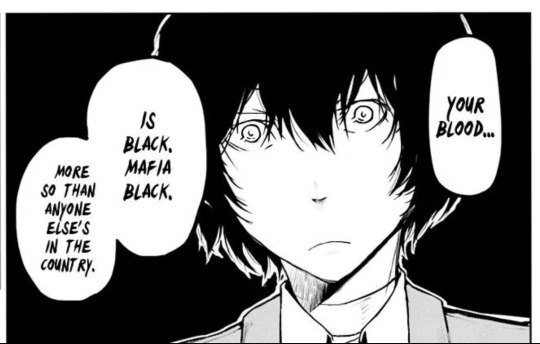
And do you know when else we see such an expression on Dazai? During Atsushi’s entrance exam when Atsushi threw himself on top of the bomb in order to protect the ADA. When I watched this part of the anime, I felt that there was a genuine shock in Dazai here when Atsushi decided on this action. And when you look at the manga panel after Dazai realized what Atsushi was doing, his eyes have turned pure white (a genuine shock).


But have you ever wondered why Dazai is so shocked and almost angered by this action? He knows that the whole act during Atsushi’s entrance exam is staged, and yet he showed such an emotion and he is not faking it.
This is because, if he were faking it, his eyes would be glossed over rather than of such a colour as in the panels above.
For example, when Ango’s car crashed.
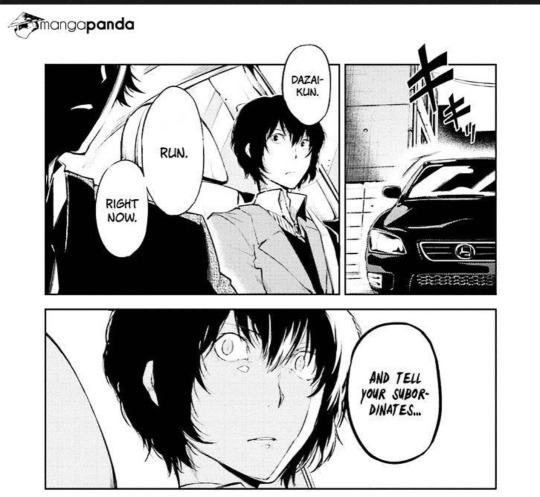
Season 3 spoiler! Or when Fyodor shot him.

Although he acted very well and seemed shocked, his eyes betray his emotions, he knew this was coming. So perhaps it is in those two events, Dazai saw in Atsushi a glimpse of what he had been searching for, which could explain their special relationship this early on.

Tag list @requiem626k @shadyteacup @alittlesimp @greenshirtimagines @jadegreenimmortality @sakikoshi @kenmasbbygrl @dazaisusedbandages @jessbeinme15 @mikasa-stan-account @missrown @ginswife @tender-rosiey @bsdparadise @internetkilledtheroxstar @n1kolaiz if you would like to be added, interact with my tag list post (preferably a comment) or send an ask! <3
#bungou stray dogs#bsd#bsd dazai#dazai osamu#bsd theories#bungou stray dogs analysis#bsd meta#bsd atsushi#literature analysis#bsd anime#japanese literature#no longer human#run melos#the setting sun#humanity#distrust#kat's analysis🔍#kat's dazai brainrot
237 notes
·
View notes
Text
Okay so I was reading the manga and this offical art really called out to me for some reason. I don't know what else to do since I've just been starring at this art for a while thinking... So I'll just dump some thoughts here ig?
Credit to DazaiScans for the translations and panels

- Firstly, the quote on the art, as written in the translator's note below is from the Dovostkey's "Demons", it kinda ties into the demon motif with Fyodor and Dazai. And I was interested by this quote, so I was reading up some quotes and this one in particular from the same book I believe(?) says this "Man is unhappy because he doesn't know he's happy; only because of that. It's everything, everything, Whoever learns will at once immediately become happy, that same moment..." I wonder if that has any relation to the reason Fyodor's mask is the only one that's smiling?
- Dazai is the only one that doesn't appear to be masked, at least obviously. At first I noticed this because I was wondering why Dazai like the others are also stringed like a puppet here... But I guess it kinda makes sense since Dazai is also kinda being played into Fyodor's schemes in this arc (the cannibalism arc), especially reflected by the wound he got on his side? But also among the others, he is the one we do not see the face of, so I wonder if that symbolizes a sort of lack of control Fyodor still has over Dazai's actions?
- Adding to the previous point to explain the point about control, it came from my thoughts about what do the masks mean? And face masks especially in Japanese culture make me think of the Noh masks the Japanese traditionally use in theaters, and with the puppet string motif going on here, it almost reminds me of a performance. So I settled on looking a bit into this culture. (Of course I myself am not very familiar with it so I do not claim what I say to be completely accurate) But from this article I read, it describes the masks from Noh theaters as "made to be expressionless" which is seen here in the offical art. And according to the article, what I found very interesting is that with adjusted lighting and positions it will lead to the masks showing different emotions. [with this line of reasoning showing how Fyodor is manipulating and controlling them to his will?? with the exception of Dazai] In another article I read, it also mentions that the eye holes of the mask are really limited (mayhaps symbolizes a limited vision and leading to them doing what Fyodor wants them to, like that in the arc itself?)
Of course I do not know any of my speculations here are truely reflected in the offical art, but it was very interesting thinking about it. Anyways thanks for reading my ramblings and incoherent thoughts :D
48 notes
·
View notes
Text
Let’s talk about Dazai’s change in Apparel
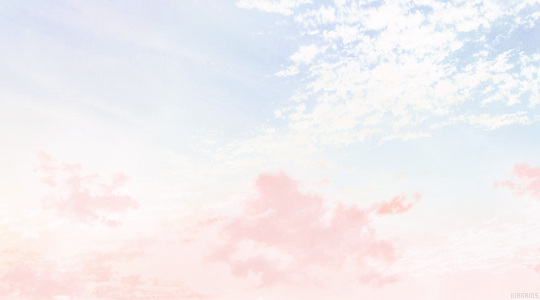

Warnings: If you hadn’t finished the anime yet, I suggest that you do not read this, thank you :)
Summary: Analyzing Dazai's clothing in connection to his character development

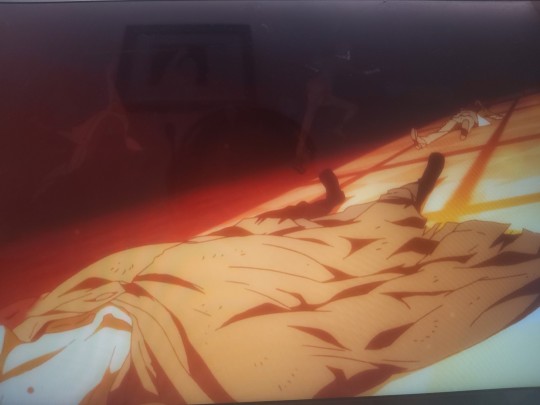
I know I said I was gonna talk about Dazai’s eyes, but I noticed something else as well, so here we go haha
As I was saying, I am rewatching Bungou Stray Dogs at this moment, and I just wanted to talk about the importance and how poetic this frame is right here. Of course, if you have seen this scene before, we all know that this scene is important because this is where Odasaku tells Dazai to go to help people, which led to him leaving the mafia and going to the ADA. But the thing that I want to talk about is not that. I want to talk about Dazai’s coat and his change that can be viewed in this very frame.
So if you look closely in this scene (I apologize for the poor quality of the picture here), we can see Dazai’s coat flying off of him as he runs to Odasaku. And from what the anime tells us, I believe that Dazai’s coat was given to him by Mori.
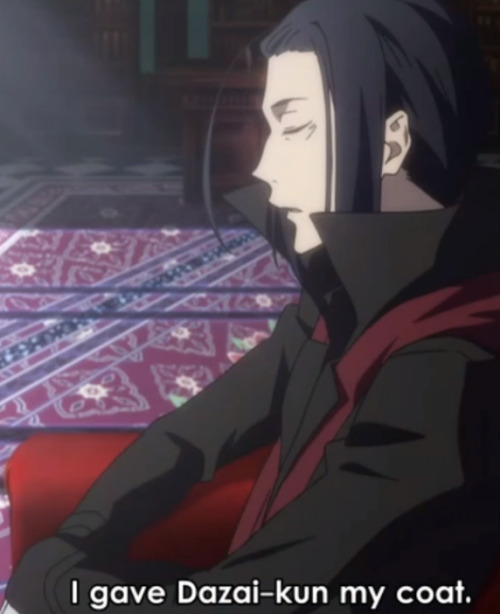
So this scene showcases the way Dazai’s identity, as a Port Mafia member is changing. This is because I don’t think I have ever seen Dazai without his coat on during the Dark Era except this scene, therefore, judging by this, we can say that Dazai’s coat is more than just an apparel, but a hint of his character and a part of who he is. Also the lighting in this scene also helps to further convey this change in Dazai as well, as we can see Dazai running from the dark to where Oda is, which is in the light, and at the same time shedding the coat, hinting at a significant change in Dazai himself. And the shedding of the bandages around his eyes as well showcases this even further and much clearer to the audience, especially if you’re watching for the first time, of Dazai’s change that happened because of Oda’s words that eventually led him to becoming a part of the ADA and trying to help people.
After that scene, we immediately see Dazai in a whole different apparel, although still resembling that of his Port mafia outfit, it is a lot brighter in tone.
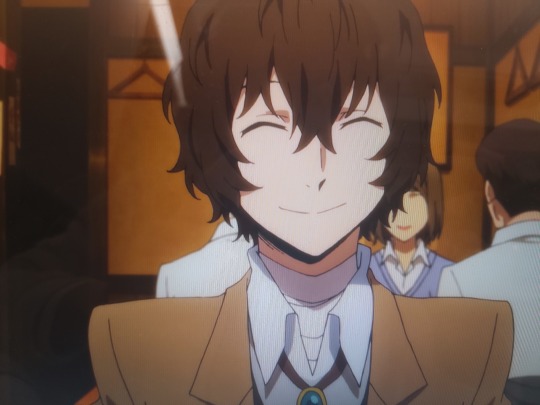
This only continues to add to my theory that Dazai’s apparel, and in this case his coat, means a lot to him and his own view of his identity as who he is as a person. This is because, there is no need for Dazai to only change his clothing, if he wanted to disappear and become a whole different person, he could’ve dyed his hair or do something to change his most recognizable features instead. I mean, in this scene even Mr. Taneda was able to recognize Dazai right away even after his change of outfit, which only convinces me that his change of clothes is more of a mental comfort to convince himself that perhaps he is able to do what Odasaku wants him to do, help people and do good, even though he himself is perhaps unsure that he could even accomplish it. The fact that he even said that he burned the coat that Mori gave him further showcases his determination to fulfill Oda’s dying words, and perhaps even changing himself for the better.
Also, I would like to point out the similarities of Dazai’s coat and Oda’s coat.
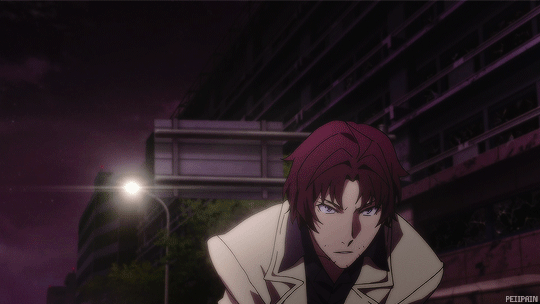
Although the colour and the length differs slightly, it is not hard to see the similarities between them, which perhaps means that Dazai’s current coat is inspired by Oda who led him on a new path to perhaps change himself, thus in a sense ‘creating’ and influencing the development of ADA Dazai and who he is as a person.
Because of all these evidence, I’m quite convinced that this episode is the dying and rebirth stage of Dazai’s identity, which if you are familiar with the literary concept of the Hero’s journey by Joseph Campbell, can be both physical or mental.

This shows to us that we have only seen part of Dazai’s growth and his ‘hero’s journey’ so far! And that Dazai is still growing and changing as a person even if it is little by little and one step as a time. And as I have discussed with @beyondthewordsfan-blog before, I believe that Atsushi is the key to this, hopeful, change in Dazai. This is most particularly seen in Dead Apple in he had shown to Dazai that he's not as bad as he thinks he is. This may actually reflect in real life Dazai's book No Longer Human's epilogue which shows that there are people who see the good in the character, despite being unable to see it in himself! This gives me a hopeful and more optimistic view of how Dazai’s end would be and hopefully bringing him closer to the path of good and allowing Dazai to finally be able to step into the ‘identity’ he so desires to have, as reflected in his change in apparel and make Odasaku proud.
What do you guys think about this? I would love to hear you opinions down below! This is actually my first time writing a post of an analysis for this anime haha, so hopefully you guys found it insightful and interesting :)
#bungo stray dogs#bungou stray dogs analysis#Dazai Osamu#odasaku sakunosuke#oda sakunosuke#bungou stray dogs mori#bungou stray dogs dazai#character analysis#bsd anime#port mafia#port mafia dazai#armed detective agency#bsd dazai#bsd spoilers#dark era dazai#kat's analysis🔍
248 notes
·
View notes
Text

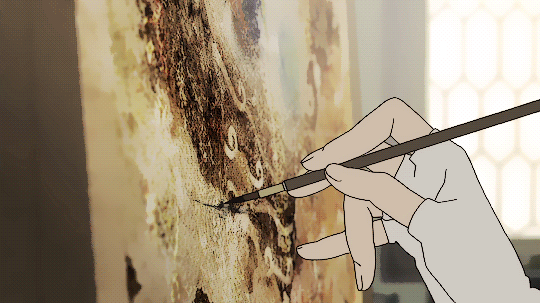
Welcome,
You must have come a long way to arrive here.
Take a seat, let me brew up some tea. Feel free to stay here as long as you wish. And let me welcome you to this humble book club I have created. Let us dive into the realm that lies between fiction and reality.
Kat · she/her · 20
Have I caught you attention? Would you like to know more about this place?

༺ Literature ༻
"As long as these roses are living I am king of my own heart."

˚˙༓࿇ My Works:
✒ On occasion when I am inspired, in addition to analyzing literature, you will find here pieces of works that I have written in my fanfic masterlist. If you would be interested to be tagged and notified when I post, please interact with my tag list (Open).
Recent Works:
The Flowers are Blooming ☁️
Snowmelt 💔☁️
It Takes Two to Tango 📃
A Masquerader with a Paper Rose 📃
His Smiles 🔬🗒
˚˙༓࿇ Analysis:
✒ You will also find analysis on the series and its characters as well, you can find them in my analysis masterlist!
✒ In addition to analyses about the series, I comment about Dazai-sensei's works as well
˚˙༓࿇ Discussions:
✒ Feel free to discuss your own theories with me as well! If I enjoyed them and became invested in them, I will put them here!

༺ Others ༻
"Happiness is being able to hope however faintly for happiness."

˚˙༓࿇ Music:
🎻 Or perhaps you would be interested in some music?
˚˙༓࿇ Misc:
💐 I also have a side blog, and A03 under @cloudsofbutterflies
📷 And random little edits
˚˙༓࿇ Credits:
🖊 Header by @/yss_nno on twt
🖊 Pfp by @/yss_nno on twt

© all work belongs to pompompurin1028 — do not repost, replicate, copy or translate
#best viewed in light mode#bungou stray dogs#bsd dazai#bungou stray dogs dazai#masterlist#dazai x reader#bsd#bsd anime#kat writes📝#kat edits📸#kat's analysis🔍#kat's dazai brainrot#navigation
144 notes
·
View notes
Text
Mini BSD Analyses Discussions
Feel free to ramble to me about your own theories as well

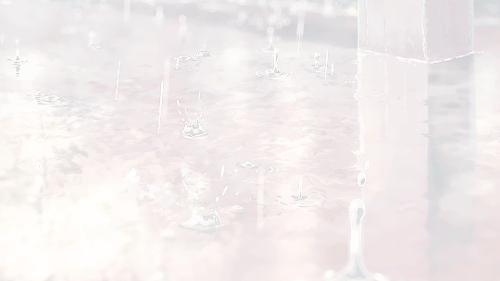

About Dazai and Dazai-sensei

🖋 Synonym and Antonym game in No Longer Human and connection to why Fyodor and Dazai do not feel human (with @phvntomhiive and @requiem626k 's additions)
🖋 Parallels between the final scene of Dead Apple and Dazai-sensei’s works
🖋 Final scene of Dead Apple and Dazai's potential growth

About Kunikida

🖋 Kunikida’s ability and Kunikida being the Azure King?
🖋 Kunikida sees the Azure King as the goal of who he should not be?

#navigation#bungou stray dogs#bsd#bsd theories#bungou stray dogs analysis#kat's analysis🔍#special thanks to Req for all the questions!
28 notes
·
View notes
Text
Dazai's Search Analysis Series


Thesis: In this series of analysis, I will discuss my belief that Dazai yearns for genuineness and trust from others, whilst being untrusting of the world/society. And his search for humanity within this "sinful" world
Analysis will be conducted using connections to Dazai-sensei’s books such as No Longer Human, The Setting Sun, Run Melos! and some other of his works
Part 1 - Dazai's Distrust for Humanity
Part 2 - Dazai's Desire to seek Genuineness and Connections to Atsushi

#masterlist#navigation#bungou stray dogs analysis#bungou stray dogs#kat's analysis🔍#bsd dazai#kat's dazai brainrot#Dazai's search analysis series
33 notes
·
View notes
Text
Analysis Masterlist


🔎 Dazai’s change in clothing
🔎 Dazai's Search for Trust, Genuineness and Humanity
🔎 The Growing Divergence of Dazai and Fyodor
🔎 Certainly Humans are Sinfully Stupid but What's wrong with that?

14 notes
·
View notes
Note
Hello pretty love, I hope you are doing well
So I wanted to discuss and take your opinion on something once again 😌
So I was rewatching bsd and it came to the scene where chuuya and dazai find Q in the basement of that warehouse I believe
Dazai refused to kill Q yes but I can’t help but feel that there is a reason other than making sure his expiration date won’t be that early and on the hands of the mafia
Especially since chuuya said that he was a softy and responded to dazai when he said that it was a rational decision with “I don’t know about that.”
Do you think that Dazai perhaps sympathizes with Q somehow? Cause from his expression it looked like he was sort of in deep thought, as if he was reminiscing something dark perhaps
IF YOU DONT HAVE THE TIME ITS TOTALLY OKAY ALSO I WANTED TO CHECK UP YOU AND MAKE SURE YOU ARE ALRIGHT
Hope you have a wonderful day dear and ilyyy 💕💕💕
Hi Rose! I’m doing alright, but I’ve been feeling pretty tired from my exams and assignment. And please don’t worry, I do have the time, I’m giving myself more of a break today😌 I hope you’re taking care of yourself too! ily too <33 Besides, analysing is always fun for me haha, so I’m just gonna ramble a bit on my opinions on things ><, fair warning this is only how I see it so I don’t know about accuracy. And ahh it makes me so happy that you wanted to hear my opinion on it T^T
Morality, Rationality and Emotions in the freeing Q Scene?
Hmm if I'm being honest I'm not quite sure what Dazai is thinking here, rewatching this scene in the anime we do see that he has a dark look in his eyes before he decides to save Q instead, but in the manga we actually don't see his expression which is quite interesting🤔
I would honestly say that the primary reason he did so is not out of sympathy. I would not rule out that he does feel some sympathy for Q, but I personally don't think that's the major reason why he freed Q. I do think he does view Q as a threat, he did threaten to kill Q after all when they met the last time, so I personally still think that sympathy is most probably not really the key factor here, if he has any sympathy for Q that is. Also because we don’t see a lot of interactions between Q and Dazai so it also makes it hard to understand the nature of their relationship. Of course I’m also not saying that Dazai does not have an emotional side, but I would say in this case in particular he most likely is guided by what he sees is the most optimal solution but also what he thinks is the “best” thing to do.
Speaking of his eyes from what you said, I actually quite like that look in his eyes during that scene though, not from a romantic perspective here agsjsks but from an analytical one. It very much reminds me of Dazai from when he's still in the PM. But the lighting is also very interesting with most of the light covering his (the majority of) face giving almost a malicious intent, yet he does otherwise, he doesn't kill them. Lighting in film can be used to reflect the psychology of a character, of course and also create tension and suspense. And especially since you added the part about Dazai saying that what he did is the most rational move and Chuuya saying he doesn’t think so it made me think a bit more about this scene and led me to thinking this interaction might’ve reflected a bit about morality of Dazai and sheds light on both their characters.
Dazai's morality is well difficult (I think this post says talks about it really well and credit goes to @/someone-save-meeee for the ideas because it really influenced what I write here). As Oda had said, he doesn't care about good or bad, but that isn't to say that he can't feel sympathy for Q here nor is it to say that he does things on a whim, nor does he seem to justify what he does as right or wrong. He kind of reminds me a bit of what was briefly talked about in my philosophy course about the argument of if there are ultimately such things that are fundamentally good or bad. Some don't believe so and I think one of the views was that we can have a sense of morality through rational thinking (however I unfortunately hadn’t studied too much on this yet, so I can’t make too much of a comment and hopefully what I had written is correct). But it does remind me of how Dazai thinks quite a bit, as Dazai said he did so because it is the most rational decision, since through doing so he could make sure that he isn’t killed since the mafia won’t have a use for him anymore. But you do make a very good point about there might be something else that led to Dazai doing this. Because... Dazai honestly as long as Chuuya has the chance of using corruption I feel that the mafia would probably not touch him since he is the only one that can stop it, plus Mori himself wants him back as an executive so if we’re being honest, it feels that, logically, killing Q probably wouldn’t make too much of a difference to his usefulness to the mafia.
So Chuuya does have a point about the rationality of Dazai’s actions, because as long as Q is alive there’s a chance that there is something similar can happen, and in order to eliminate the risk of it happening again, the most efficient they could do is kill them. But as I said, this scene also sees to show us a bit of how Chuuya thinks too. Chuuya is much more guided by his emotions than Dazai, in the beginning he was saying that how when he sees Q, he could only see the body bags that resulted from Q’s ability. Chuuya cares a lot about the people around him, his subordinates etc, and so his decisions especially in this scene are also influenced by such sentiments. So with Q hurting so many of them, it is not strange that Chuuya doesn’t want to make sure that this doesn’t happen again. So in addition to such a move being subjectively “irrational” in a sense, Chuuya’s sense of rationality especially here might be flawed since he is quite influenced by his feeling at the time.
So what does Dazai’s actions mean? When I was rereading the manga part of this, one of the things that jumped out a bit to me is what Dazai said here:
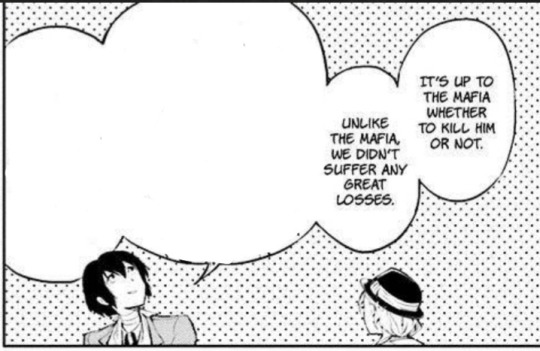
Translation credits: yeouya
“It’s up to the mafia to decide whether to kill him or not”. Yes he does appeal to logic here by saying that the ADA didn’t suffer great losses, but I don’t know there’s just something more about the fact that he said this, in my opinion at least. Because after reading the post I shared above, it feels like Dazai is saying that he feels like that is the best thing to do, not necessarily the right thing to do. I like how @/someone-save-meeee says that he appeals to his emotions, I would have never thought of it this way, but it also makes sense, especially for the “if they are deserving” part, it makes me think of that one scene during 15 when Dazai shot the body, getting off topic but anyways, but this kind of shows the difference between Dazai and Mori a bit too, since Mori as Dazai had said (if I remember correctly) the embodiment of logic(?) Mori always chooses the most optimal and logically reasonable action in all his plans, whereas Dazai appeals more to his emotions though he does use logic a lot (pretty neat). Maybe that’s why his eyes still reflect something close to when he was still in the PM? Becuase what influences his actions still remain the same, or at least similar? But one thing we see that did change, is that Dazai chooses not to kill, even when given the chance and is, to an extent, justified to do it. And that is something that seems different in Dazai, when in contrast I feel that during his time in the PM he just chooses to do it, and shrugs it off because he is to an extent justified in doing so? Like he isn’t the type of person to kill for fun, but then when he is told to do it (like as an order) he isn’t hesitant to, I don’t know if that makes sense but yeah.
I think that is all I want to say? agsjsks I’m sorry I kind of went off topic ;-; but this was very interesting for me to think about. Thanks for reading to the end of my ramblings ><
6 notes
·
View notes